Planning Cluster Off-the-job Assessment One
VerifiedAdded on 2023/04/07
|37
|6559
|429
AI Summary
This off-the-job assessment for the Planning Cluster in Early Childhood Education and Care requires the creation of a personal philosophy, evaluation of curriculum formats, and providing community resources for inclusion and additional needs.
Contribute Materials
Your contribution can guide someone’s learning journey. Share your
documents today.
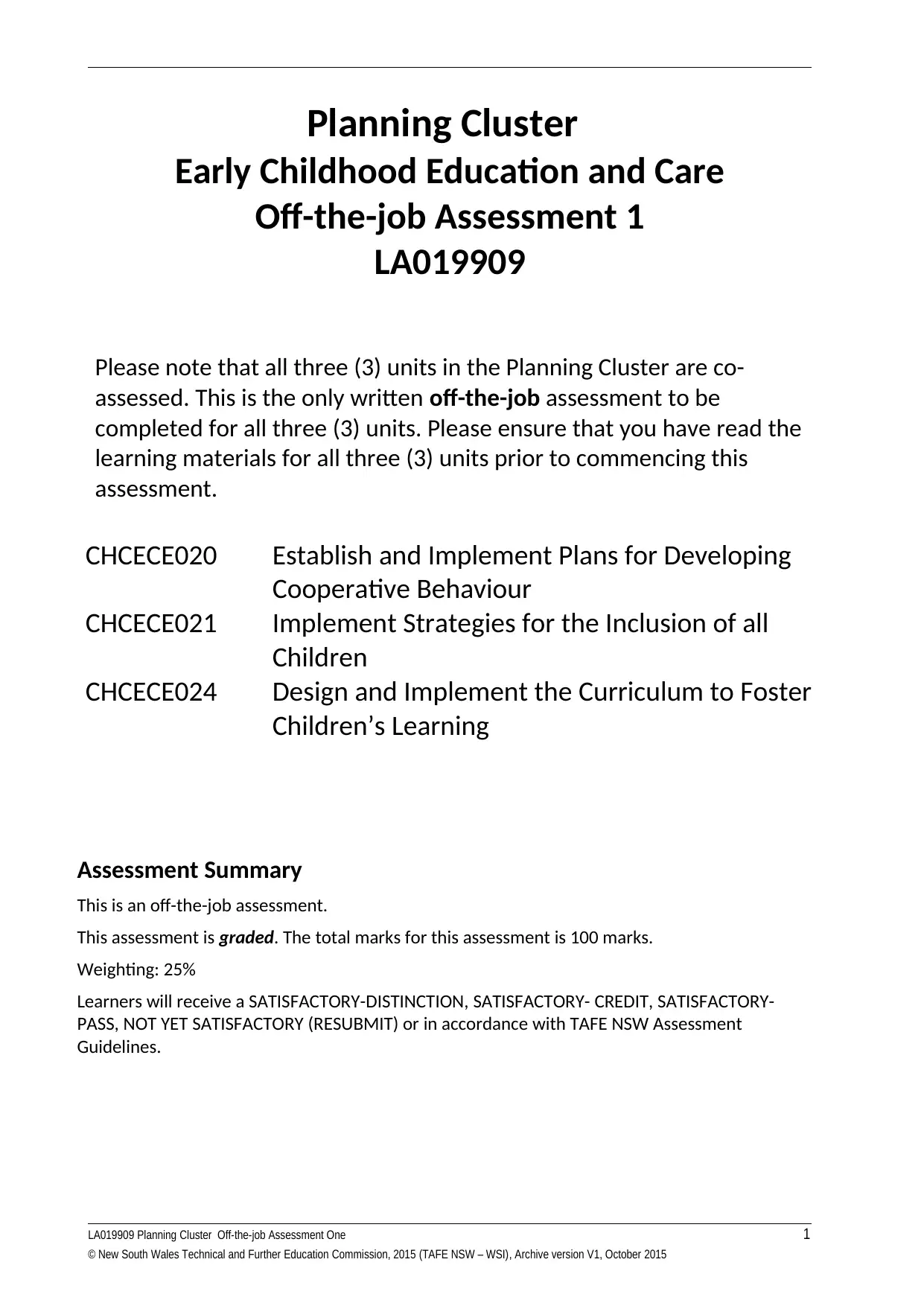
Planning Cluster
Early Childhood Education and Care
Off-the-job Assessment 1
LA019909
Please note that all three (3) units in the Planning Cluster are co-
assessed. This is the only written off-the-job assessment to be
completed for all three (3) units. Please ensure that you have read the
learning materials for all three (3) units prior to commencing this
assessment.
CHCECE020 Establish and Implement Plans for Developing
Cooperative Behaviour
CHCECE021 Implement Strategies for the Inclusion of all
Children
CHCECE024 Design and Implement the Curriculum to Foster
Children’s Learning
Assessment Summary
This is an off-the-job assessment.
This assessment is graded. The total marks for this assessment is 100 marks.
Weighting: 25%
Learners will receive a SATISFACTORY-DISTINCTION, SATISFACTORY- CREDIT, SATISFACTORY-
PASS, NOT YET SATISFACTORY (RESUBMIT) or in accordance with TAFE NSW Assessment
Guidelines.
LA019909 Planning Cluster Off-the-job Assessment One 1
© New South Wales Technical and Further Education Commission, 2015 (TAFE NSW – WSI), Archive version V1, October 2015
Early Childhood Education and Care
Off-the-job Assessment 1
LA019909
Please note that all three (3) units in the Planning Cluster are co-
assessed. This is the only written off-the-job assessment to be
completed for all three (3) units. Please ensure that you have read the
learning materials for all three (3) units prior to commencing this
assessment.
CHCECE020 Establish and Implement Plans for Developing
Cooperative Behaviour
CHCECE021 Implement Strategies for the Inclusion of all
Children
CHCECE024 Design and Implement the Curriculum to Foster
Children’s Learning
Assessment Summary
This is an off-the-job assessment.
This assessment is graded. The total marks for this assessment is 100 marks.
Weighting: 25%
Learners will receive a SATISFACTORY-DISTINCTION, SATISFACTORY- CREDIT, SATISFACTORY-
PASS, NOT YET SATISFACTORY (RESUBMIT) or in accordance with TAFE NSW Assessment
Guidelines.
LA019909 Planning Cluster Off-the-job Assessment One 1
© New South Wales Technical and Further Education Commission, 2015 (TAFE NSW – WSI), Archive version V1, October 2015
Secure Best Marks with AI Grader
Need help grading? Try our AI Grader for instant feedback on your assignments.
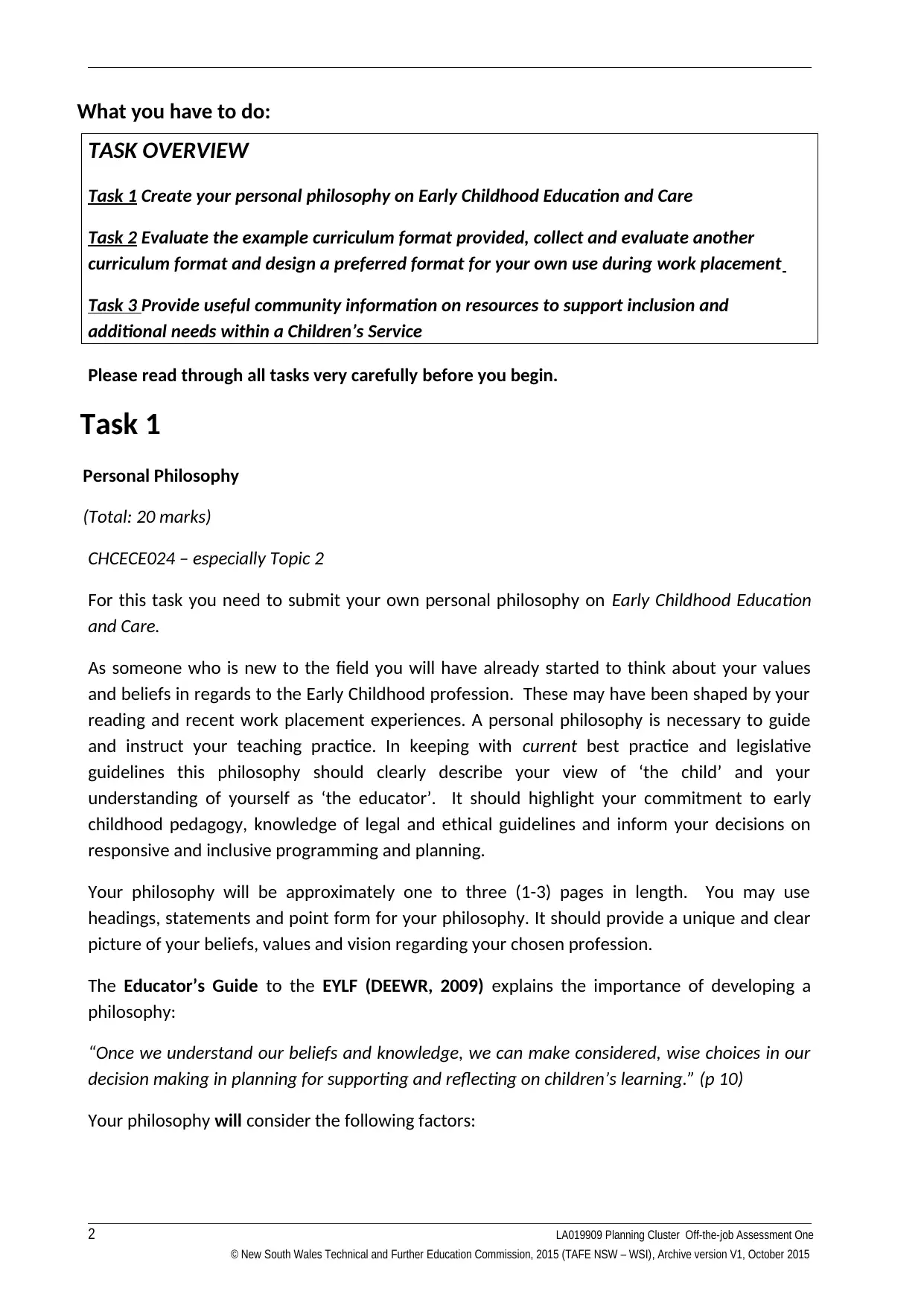
What you have to do:
TASK OVERVIEW
Task 1 Create your personal philosophy on Early Childhood Education and Care
Task 2 Evaluate the example curriculum format provided, collect and evaluate another
curriculum format and design a preferred format for your own use during work placement
Task 3 Provide useful community information on resources to support inclusion and
additional needs within a Children’s Service
Please read through all tasks very carefully before you begin.
Task 1
Personal Philosophy
(Total: 20 marks)
CHCECE024 – especially Topic 2
For this task you need to submit your own personal philosophy on Early Childhood Education
and Care.
As someone who is new to the field you will have already started to think about your values
and beliefs in regards to the Early Childhood profession. These may have been shaped by your
reading and recent work placement experiences. A personal philosophy is necessary to guide
and instruct your teaching practice. In keeping with current best practice and legislative
guidelines this philosophy should clearly describe your view of ‘the child’ and your
understanding of yourself as ‘the educator’. It should highlight your commitment to early
childhood pedagogy, knowledge of legal and ethical guidelines and inform your decisions on
responsive and inclusive programming and planning.
Your philosophy will be approximately one to three (1-3) pages in length. You may use
headings, statements and point form for your philosophy. It should provide a unique and clear
picture of your beliefs, values and vision regarding your chosen profession.
The Educator’s Guide to the EYLF (DEEWR, 2009) explains the importance of developing a
philosophy:
“Once we understand our beliefs and knowledge, we can make considered, wise choices in our
decision making in planning for supporting and reflecting on children’s learning.” (p 10)
Your philosophy will consider the following factors:
2 LA019909 Planning Cluster Off-the-job Assessment One
© New South Wales Technical and Further Education Commission, 2015 (TAFE NSW – WSI), Archive version V1, October 2015
TASK OVERVIEW
Task 1 Create your personal philosophy on Early Childhood Education and Care
Task 2 Evaluate the example curriculum format provided, collect and evaluate another
curriculum format and design a preferred format for your own use during work placement
Task 3 Provide useful community information on resources to support inclusion and
additional needs within a Children’s Service
Please read through all tasks very carefully before you begin.
Task 1
Personal Philosophy
(Total: 20 marks)
CHCECE024 – especially Topic 2
For this task you need to submit your own personal philosophy on Early Childhood Education
and Care.
As someone who is new to the field you will have already started to think about your values
and beliefs in regards to the Early Childhood profession. These may have been shaped by your
reading and recent work placement experiences. A personal philosophy is necessary to guide
and instruct your teaching practice. In keeping with current best practice and legislative
guidelines this philosophy should clearly describe your view of ‘the child’ and your
understanding of yourself as ‘the educator’. It should highlight your commitment to early
childhood pedagogy, knowledge of legal and ethical guidelines and inform your decisions on
responsive and inclusive programming and planning.
Your philosophy will be approximately one to three (1-3) pages in length. You may use
headings, statements and point form for your philosophy. It should provide a unique and clear
picture of your beliefs, values and vision regarding your chosen profession.
The Educator’s Guide to the EYLF (DEEWR, 2009) explains the importance of developing a
philosophy:
“Once we understand our beliefs and knowledge, we can make considered, wise choices in our
decision making in planning for supporting and reflecting on children’s learning.” (p 10)
Your philosophy will consider the following factors:
2 LA019909 Planning Cluster Off-the-job Assessment One
© New South Wales Technical and Further Education Commission, 2015 (TAFE NSW – WSI), Archive version V1, October 2015
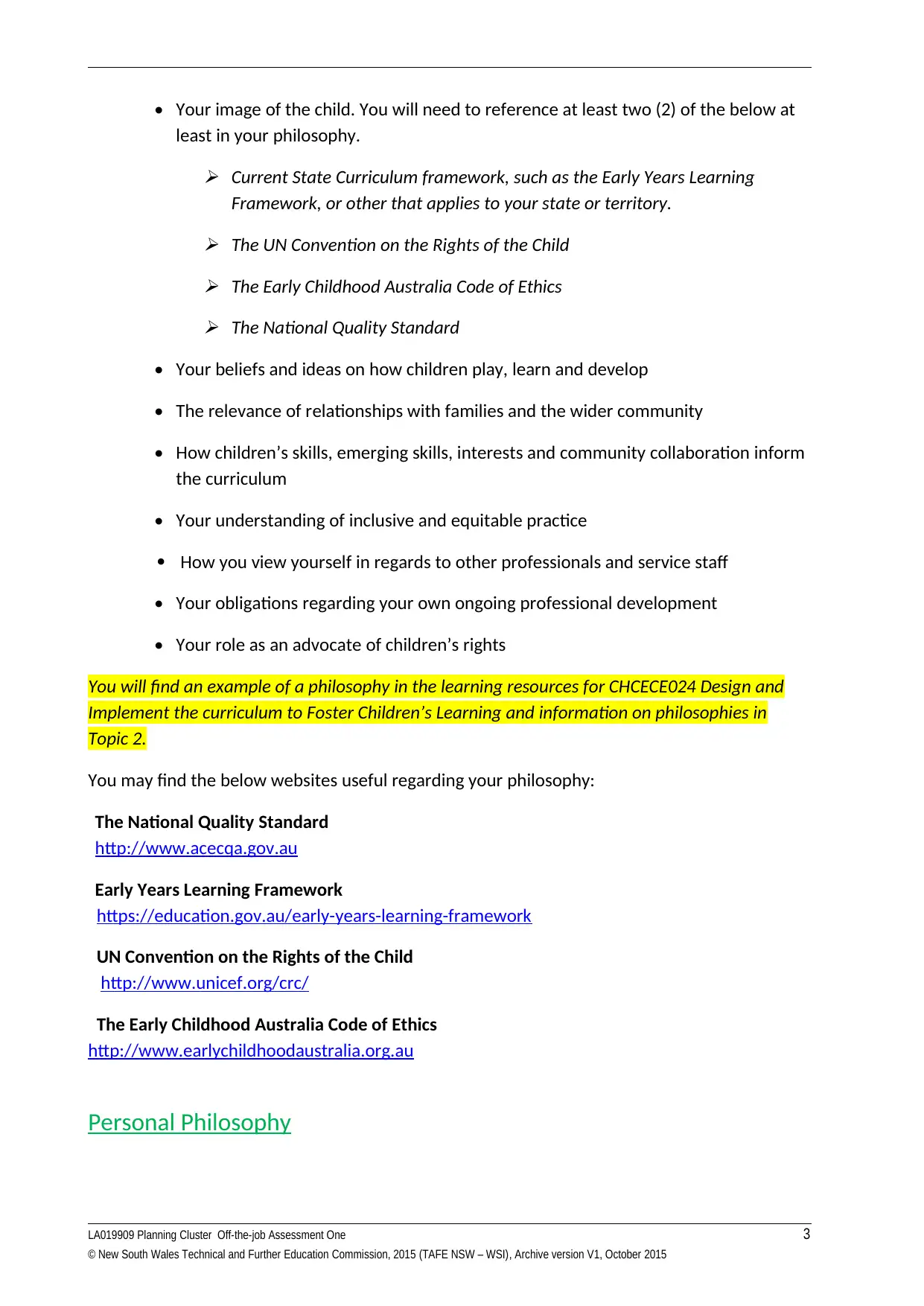
• Your image of the child. You will need to reference at least two (2) of the below at
least in your philosophy.
Current State Curriculum framework, such as the Early Years Learning
Framework, or other that applies to your state or territory.
The UN Convention on the Rights of the Child
The Early Childhood Australia Code of Ethics
The National Quality Standard
• Your beliefs and ideas on how children play, learn and develop
• The relevance of relationships with families and the wider community
• How children’s skills, emerging skills, interests and community collaboration inform
the curriculum
• Your understanding of inclusive and equitable practice
How you view yourself in regards to other professionals and service staff
• Your obligations regarding your own ongoing professional development
• Your role as an advocate of children’s rights
You will find an example of a philosophy in the learning resources for CHCECE024 Design and
Implement the curriculum to Foster Children’s Learning and information on philosophies in
Topic 2.
You may find the below websites useful regarding your philosophy:
The National Quality Standard
http://www.acecqa.gov.au
Early Years Learning Framework
https://education.gov.au/early-years-learning-framework
UN Convention on the Rights of the Child
http://www.unicef.org/crc/
The Early Childhood Australia Code of Ethics
http://www.earlychildhoodaustralia.org.au
Personal Philosophy
LA019909 Planning Cluster Off-the-job Assessment One 3
© New South Wales Technical and Further Education Commission, 2015 (TAFE NSW – WSI), Archive version V1, October 2015
least in your philosophy.
Current State Curriculum framework, such as the Early Years Learning
Framework, or other that applies to your state or territory.
The UN Convention on the Rights of the Child
The Early Childhood Australia Code of Ethics
The National Quality Standard
• Your beliefs and ideas on how children play, learn and develop
• The relevance of relationships with families and the wider community
• How children’s skills, emerging skills, interests and community collaboration inform
the curriculum
• Your understanding of inclusive and equitable practice
How you view yourself in regards to other professionals and service staff
• Your obligations regarding your own ongoing professional development
• Your role as an advocate of children’s rights
You will find an example of a philosophy in the learning resources for CHCECE024 Design and
Implement the curriculum to Foster Children’s Learning and information on philosophies in
Topic 2.
You may find the below websites useful regarding your philosophy:
The National Quality Standard
http://www.acecqa.gov.au
Early Years Learning Framework
https://education.gov.au/early-years-learning-framework
UN Convention on the Rights of the Child
http://www.unicef.org/crc/
The Early Childhood Australia Code of Ethics
http://www.earlychildhoodaustralia.org.au
Personal Philosophy
LA019909 Planning Cluster Off-the-job Assessment One 3
© New South Wales Technical and Further Education Commission, 2015 (TAFE NSW – WSI), Archive version V1, October 2015
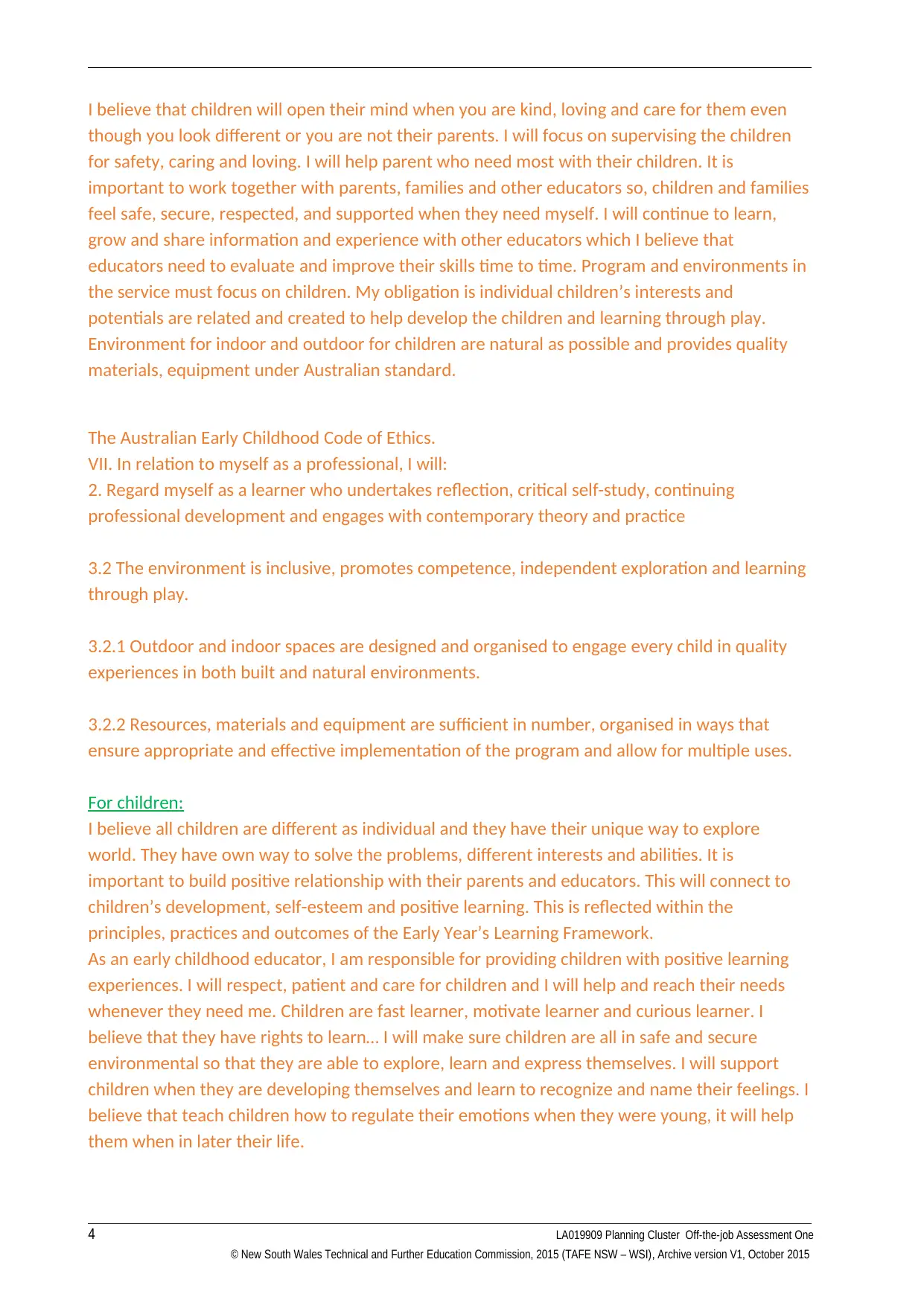
I believe that children will open their mind when you are kind, loving and care for them even
though you look different or you are not their parents. I will focus on supervising the children
for safety, caring and loving. I will help parent who need most with their children. It is
important to work together with parents, families and other educators so, children and families
feel safe, secure, respected, and supported when they need myself. I will continue to learn,
grow and share information and experience with other educators which I believe that
educators need to evaluate and improve their skills time to time. Program and environments in
the service must focus on children. My obligation is individual children’s interests and
potentials are related and created to help develop the children and learning through play.
Environment for indoor and outdoor for children are natural as possible and provides quality
materials, equipment under Australian standard.
The Australian Early Childhood Code of Ethics.
VII. In relation to myself as a professional, I will:
2. Regard myself as a learner who undertakes reflection, critical self-study, continuing
professional development and engages with contemporary theory and practice
3.2 The environment is inclusive, promotes competence, independent exploration and learning
through play.
3.2.1 Outdoor and indoor spaces are designed and organised to engage every child in quality
experiences in both built and natural environments.
3.2.2 Resources, materials and equipment are sufficient in number, organised in ways that
ensure appropriate and effective implementation of the program and allow for multiple uses.
For children:
I believe all children are different as individual and they have their unique way to explore
world. They have own way to solve the problems, different interests and abilities. It is
important to build positive relationship with their parents and educators. This will connect to
children’s development, self-esteem and positive learning. This is reflected within the
principles, practices and outcomes of the Early Year’s Learning Framework.
As an early childhood educator, I am responsible for providing children with positive learning
experiences. I will respect, patient and care for children and I will help and reach their needs
whenever they need me. Children are fast learner, motivate learner and curious learner. I
believe that they have rights to learn… I will make sure children are all in safe and secure
environmental so that they are able to explore, learn and express themselves. I will support
children when they are developing themselves and learn to recognize and name their feelings. I
believe that teach children how to regulate their emotions when they were young, it will help
them when in later their life.
4 LA019909 Planning Cluster Off-the-job Assessment One
© New South Wales Technical and Further Education Commission, 2015 (TAFE NSW – WSI), Archive version V1, October 2015
though you look different or you are not their parents. I will focus on supervising the children
for safety, caring and loving. I will help parent who need most with their children. It is
important to work together with parents, families and other educators so, children and families
feel safe, secure, respected, and supported when they need myself. I will continue to learn,
grow and share information and experience with other educators which I believe that
educators need to evaluate and improve their skills time to time. Program and environments in
the service must focus on children. My obligation is individual children’s interests and
potentials are related and created to help develop the children and learning through play.
Environment for indoor and outdoor for children are natural as possible and provides quality
materials, equipment under Australian standard.
The Australian Early Childhood Code of Ethics.
VII. In relation to myself as a professional, I will:
2. Regard myself as a learner who undertakes reflection, critical self-study, continuing
professional development and engages with contemporary theory and practice
3.2 The environment is inclusive, promotes competence, independent exploration and learning
through play.
3.2.1 Outdoor and indoor spaces are designed and organised to engage every child in quality
experiences in both built and natural environments.
3.2.2 Resources, materials and equipment are sufficient in number, organised in ways that
ensure appropriate and effective implementation of the program and allow for multiple uses.
For children:
I believe all children are different as individual and they have their unique way to explore
world. They have own way to solve the problems, different interests and abilities. It is
important to build positive relationship with their parents and educators. This will connect to
children’s development, self-esteem and positive learning. This is reflected within the
principles, practices and outcomes of the Early Year’s Learning Framework.
As an early childhood educator, I am responsible for providing children with positive learning
experiences. I will respect, patient and care for children and I will help and reach their needs
whenever they need me. Children are fast learner, motivate learner and curious learner. I
believe that they have rights to learn… I will make sure children are all in safe and secure
environmental so that they are able to explore, learn and express themselves. I will support
children when they are developing themselves and learn to recognize and name their feelings. I
believe that teach children how to regulate their emotions when they were young, it will help
them when in later their life.
4 LA019909 Planning Cluster Off-the-job Assessment One
© New South Wales Technical and Further Education Commission, 2015 (TAFE NSW – WSI), Archive version V1, October 2015
Secure Best Marks with AI Grader
Need help grading? Try our AI Grader for instant feedback on your assignments.
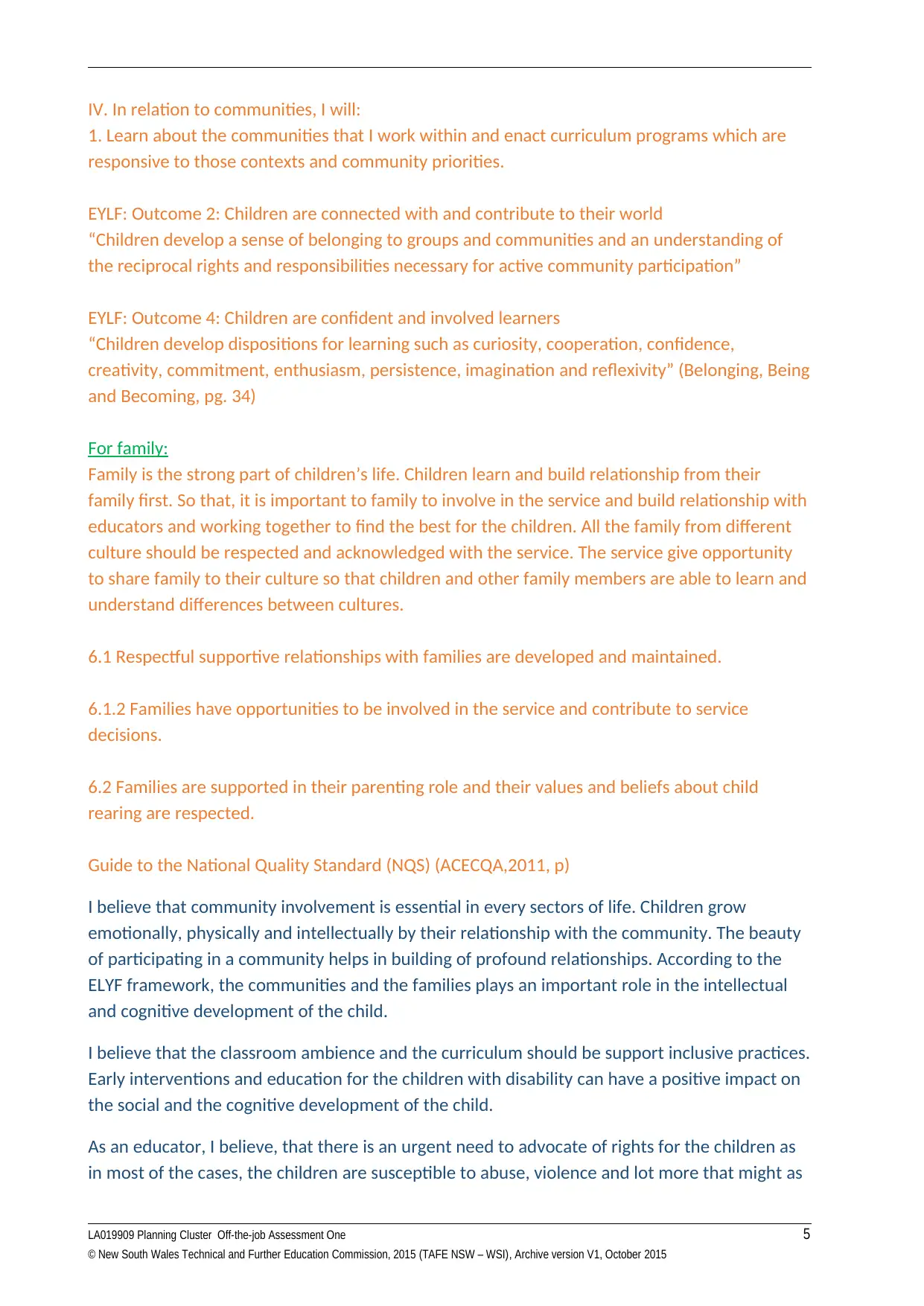
IV. In relation to communities, I will:
1. Learn about the communities that I work within and enact curriculum programs which are
responsive to those contexts and community priorities.
EYLF: Outcome 2: Children are connected with and contribute to their world
“Children develop a sense of belonging to groups and communities and an understanding of
the reciprocal rights and responsibilities necessary for active community participation”
EYLF: Outcome 4: Children are confident and involved learners
“Children develop dispositions for learning such as curiosity, cooperation, confidence,
creativity, commitment, enthusiasm, persistence, imagination and reflexivity” (Belonging, Being
and Becoming, pg. 34)
For family:
Family is the strong part of children’s life. Children learn and build relationship from their
family first. So that, it is important to family to involve in the service and build relationship with
educators and working together to find the best for the children. All the family from different
culture should be respected and acknowledged with the service. The service give opportunity
to share family to their culture so that children and other family members are able to learn and
understand differences between cultures.
6.1 Respectful supportive relationships with families are developed and maintained.
6.1.2 Families have opportunities to be involved in the service and contribute to service
decisions.
6.2 Families are supported in their parenting role and their values and beliefs about child
rearing are respected.
Guide to the National Quality Standard (NQS) (ACECQA,2011, p)
I believe that community involvement is essential in every sectors of life. Children grow
emotionally, physically and intellectually by their relationship with the community. The beauty
of participating in a community helps in building of profound relationships. According to the
ELYF framework, the communities and the families plays an important role in the intellectual
and cognitive development of the child.
I believe that the classroom ambience and the curriculum should be support inclusive practices.
Early interventions and education for the children with disability can have a positive impact on
the social and the cognitive development of the child.
As an educator, I believe, that there is an urgent need to advocate of rights for the children as
in most of the cases, the children are susceptible to abuse, violence and lot more that might as
LA019909 Planning Cluster Off-the-job Assessment One 5
© New South Wales Technical and Further Education Commission, 2015 (TAFE NSW – WSI), Archive version V1, October 2015
1. Learn about the communities that I work within and enact curriculum programs which are
responsive to those contexts and community priorities.
EYLF: Outcome 2: Children are connected with and contribute to their world
“Children develop a sense of belonging to groups and communities and an understanding of
the reciprocal rights and responsibilities necessary for active community participation”
EYLF: Outcome 4: Children are confident and involved learners
“Children develop dispositions for learning such as curiosity, cooperation, confidence,
creativity, commitment, enthusiasm, persistence, imagination and reflexivity” (Belonging, Being
and Becoming, pg. 34)
For family:
Family is the strong part of children’s life. Children learn and build relationship from their
family first. So that, it is important to family to involve in the service and build relationship with
educators and working together to find the best for the children. All the family from different
culture should be respected and acknowledged with the service. The service give opportunity
to share family to their culture so that children and other family members are able to learn and
understand differences between cultures.
6.1 Respectful supportive relationships with families are developed and maintained.
6.1.2 Families have opportunities to be involved in the service and contribute to service
decisions.
6.2 Families are supported in their parenting role and their values and beliefs about child
rearing are respected.
Guide to the National Quality Standard (NQS) (ACECQA,2011, p)
I believe that community involvement is essential in every sectors of life. Children grow
emotionally, physically and intellectually by their relationship with the community. The beauty
of participating in a community helps in building of profound relationships. According to the
ELYF framework, the communities and the families plays an important role in the intellectual
and cognitive development of the child.
I believe that the classroom ambience and the curriculum should be support inclusive practices.
Early interventions and education for the children with disability can have a positive impact on
the social and the cognitive development of the child.
As an educator, I believe, that there is an urgent need to advocate of rights for the children as
in most of the cases, the children are susceptible to abuse, violence and lot more that might as
LA019909 Planning Cluster Off-the-job Assessment One 5
© New South Wales Technical and Further Education Commission, 2015 (TAFE NSW – WSI), Archive version V1, October 2015
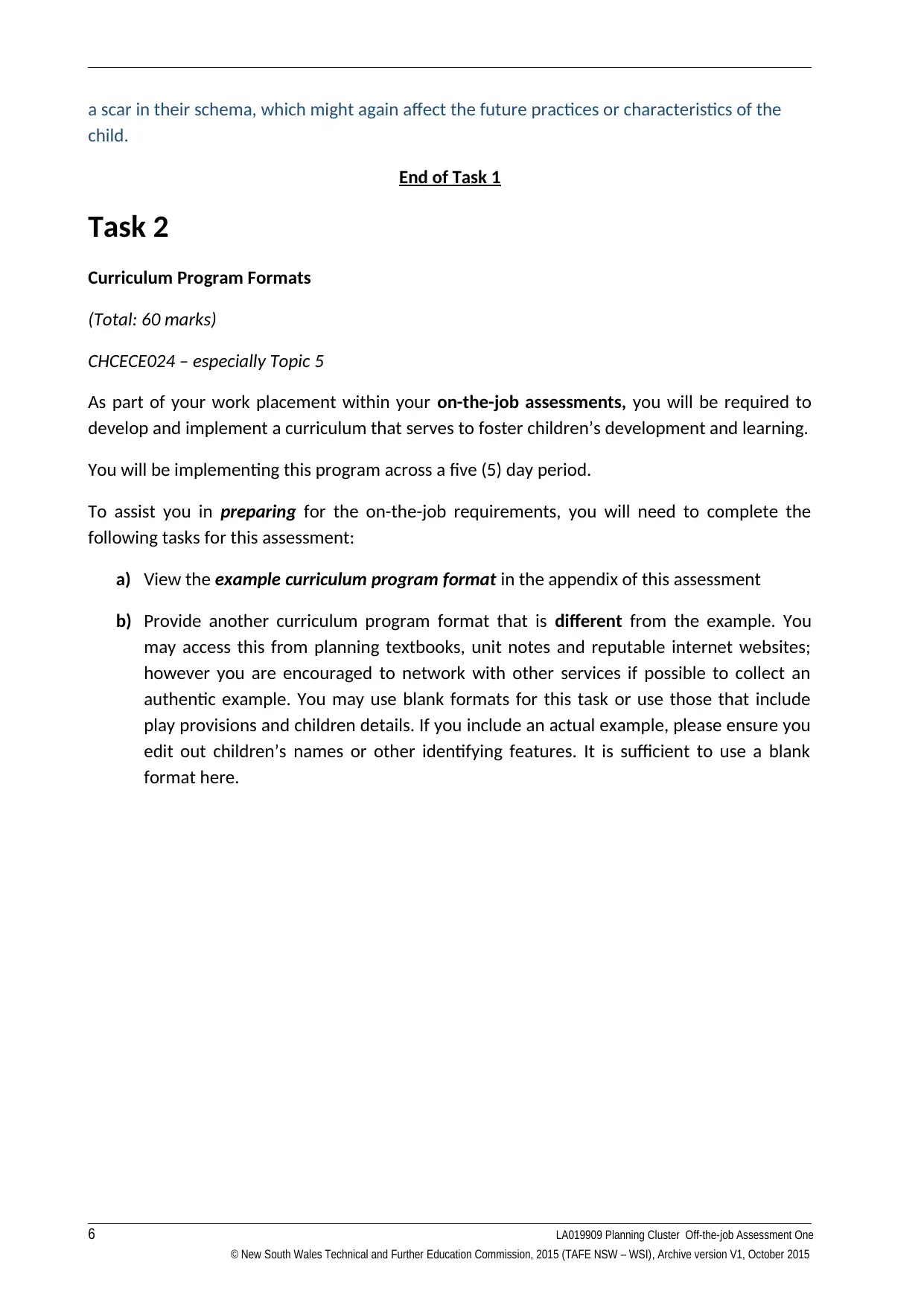
a scar in their schema, which might again affect the future practices or characteristics of the
child.
End of Task 1
Task 2
Curriculum Program Formats
(Total: 60 marks)
CHCECE024 – especially Topic 5
As part of your work placement within your on-the-job assessments, you will be required to
develop and implement a curriculum that serves to foster children’s development and learning.
You will be implementing this program across a five (5) day period.
To assist you in preparing for the on-the-job requirements, you will need to complete the
following tasks for this assessment:
a) View the example curriculum program format in the appendix of this assessment
b) Provide another curriculum program format that is different from the example. You
may access this from planning textbooks, unit notes and reputable internet websites;
however you are encouraged to network with other services if possible to collect an
authentic example. You may use blank formats for this task or use those that include
play provisions and children details. If you include an actual example, please ensure you
edit out children’s names or other identifying features. It is sufficient to use a blank
format here.
6 LA019909 Planning Cluster Off-the-job Assessment One
© New South Wales Technical and Further Education Commission, 2015 (TAFE NSW – WSI), Archive version V1, October 2015
child.
End of Task 1
Task 2
Curriculum Program Formats
(Total: 60 marks)
CHCECE024 – especially Topic 5
As part of your work placement within your on-the-job assessments, you will be required to
develop and implement a curriculum that serves to foster children’s development and learning.
You will be implementing this program across a five (5) day period.
To assist you in preparing for the on-the-job requirements, you will need to complete the
following tasks for this assessment:
a) View the example curriculum program format in the appendix of this assessment
b) Provide another curriculum program format that is different from the example. You
may access this from planning textbooks, unit notes and reputable internet websites;
however you are encouraged to network with other services if possible to collect an
authentic example. You may use blank formats for this task or use those that include
play provisions and children details. If you include an actual example, please ensure you
edit out children’s names or other identifying features. It is sufficient to use a blank
format here.
6 LA019909 Planning Cluster Off-the-job Assessment One
© New South Wales Technical and Further Education Commission, 2015 (TAFE NSW – WSI), Archive version V1, October 2015
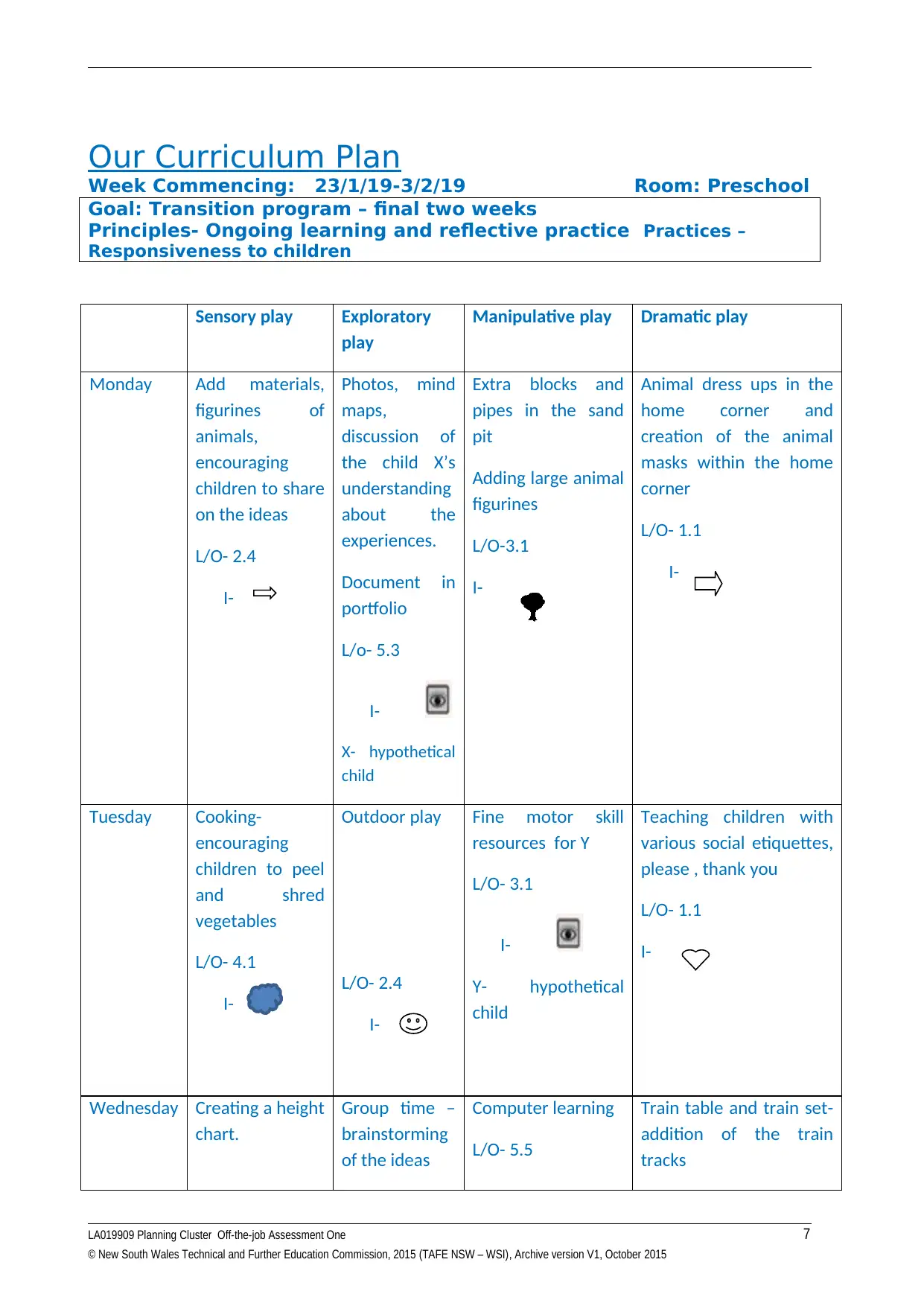
Our Curriculum Plan
Week Commencing: 23/1/19-3/2/19 Room: Preschool
Goal: Transition program – final two weeks
Principles- Ongoing learning and reflective practice Practices –
Responsiveness to children
Sensory play Exploratory
play
Manipulative play Dramatic play
Monday Add materials,
figurines of
animals,
encouraging
children to share
on the ideas
L/O- 2.4
I-
Photos, mind
maps,
discussion of
the child X’s
understanding
about the
experiences.
Document in
portfolio
L/o- 5.3
I-
X- hypothetical
child
Extra blocks and
pipes in the sand
pit
Adding large animal
figurines
L/O-3.1
I-
Animal dress ups in the
home corner and
creation of the animal
masks within the home
corner
L/O- 1.1
I-
Tuesday Cooking-
encouraging
children to peel
and shred
vegetables
L/O- 4.1
I-
Outdoor play
L/O- 2.4
I-
Fine motor skill
resources for Y
L/O- 3.1
I-
Y- hypothetical
child
Teaching children with
various social etiquettes,
please , thank you
L/O- 1.1
I-
Wednesday Creating a height
chart.
Group time –
brainstorming
of the ideas
Computer learning
L/O- 5.5
Train table and train set-
addition of the train
tracks
LA019909 Planning Cluster Off-the-job Assessment One 7
© New South Wales Technical and Further Education Commission, 2015 (TAFE NSW – WSI), Archive version V1, October 2015
Week Commencing: 23/1/19-3/2/19 Room: Preschool
Goal: Transition program – final two weeks
Principles- Ongoing learning and reflective practice Practices –
Responsiveness to children
Sensory play Exploratory
play
Manipulative play Dramatic play
Monday Add materials,
figurines of
animals,
encouraging
children to share
on the ideas
L/O- 2.4
I-
Photos, mind
maps,
discussion of
the child X’s
understanding
about the
experiences.
Document in
portfolio
L/o- 5.3
I-
X- hypothetical
child
Extra blocks and
pipes in the sand
pit
Adding large animal
figurines
L/O-3.1
I-
Animal dress ups in the
home corner and
creation of the animal
masks within the home
corner
L/O- 1.1
I-
Tuesday Cooking-
encouraging
children to peel
and shred
vegetables
L/O- 4.1
I-
Outdoor play
L/O- 2.4
I-
Fine motor skill
resources for Y
L/O- 3.1
I-
Y- hypothetical
child
Teaching children with
various social etiquettes,
please , thank you
L/O- 1.1
I-
Wednesday Creating a height
chart.
Group time –
brainstorming
of the ideas
Computer learning
L/O- 5.5
Train table and train set-
addition of the train
tracks
LA019909 Planning Cluster Off-the-job Assessment One 7
© New South Wales Technical and Further Education Commission, 2015 (TAFE NSW – WSI), Archive version V1, October 2015
Paraphrase This Document
Need a fresh take? Get an instant paraphrase of this document with our AI Paraphraser
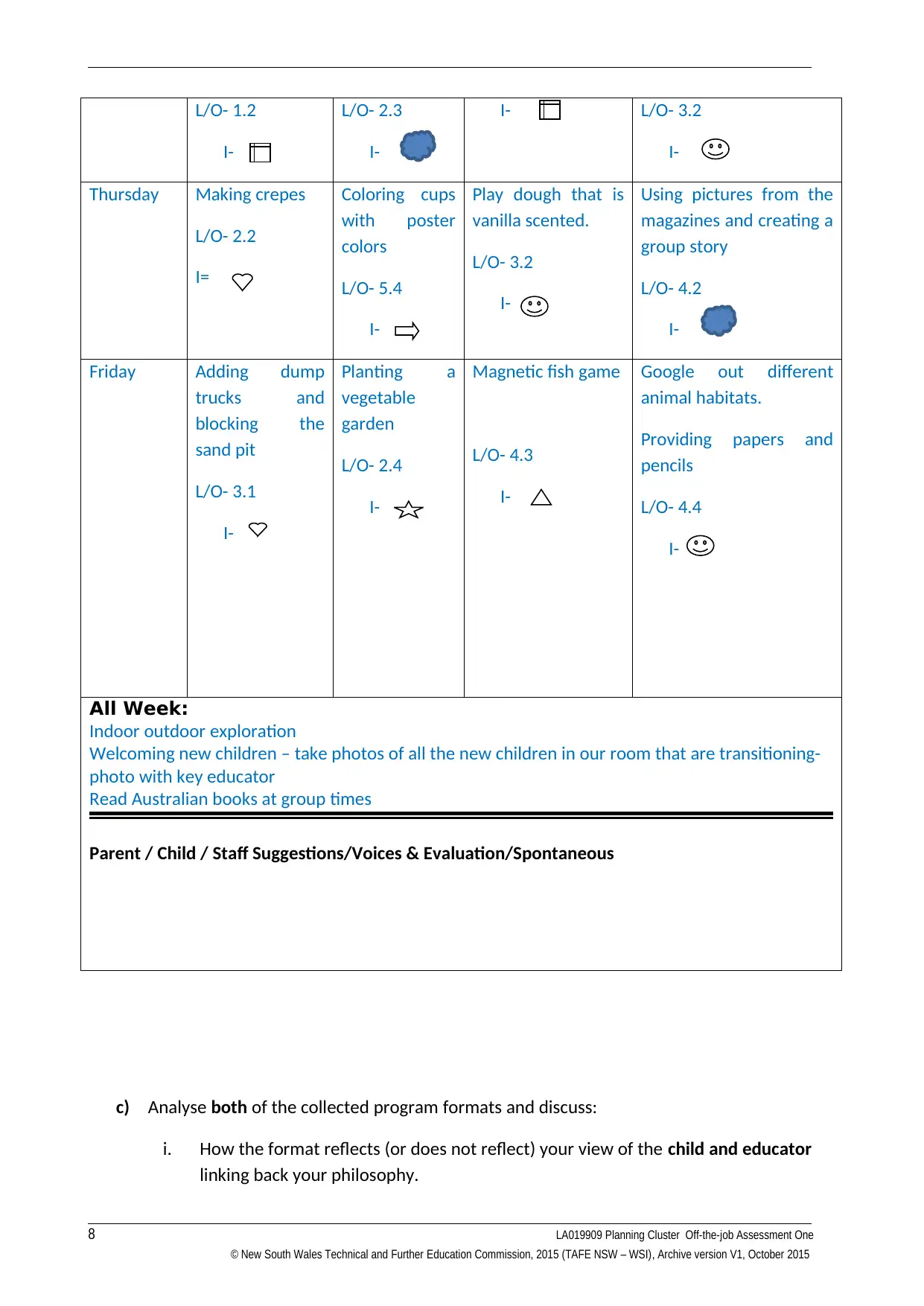
L/O- 1.2
I-
L/O- 2.3
I-
I- L/O- 3.2
I-
Thursday Making crepes
L/O- 2.2
I=
Coloring cups
with poster
colors
L/O- 5.4
I-
Play dough that is
vanilla scented.
L/O- 3.2
I-
Using pictures from the
magazines and creating a
group story
L/O- 4.2
I-
Friday Adding dump
trucks and
blocking the
sand pit
L/O- 3.1
I-
Planting a
vegetable
garden
L/O- 2.4
I-
Magnetic fish game
L/O- 4.3
I-
Google out different
animal habitats.
Providing papers and
pencils
L/O- 4.4
I-
All Week:
Indoor outdoor exploration
Welcoming new children – take photos of all the new children in our room that are transitioning-
photo with key educator
Read Australian books at group times
Parent / Child / Staff Suggestions/Voices & Evaluation/Spontaneous
c) Analyse both of the collected program formats and discuss:
i. How the format reflects (or does not reflect) your view of the child and educator
linking back your philosophy.
8 LA019909 Planning Cluster Off-the-job Assessment One
© New South Wales Technical and Further Education Commission, 2015 (TAFE NSW – WSI), Archive version V1, October 2015
I-
L/O- 2.3
I-
I- L/O- 3.2
I-
Thursday Making crepes
L/O- 2.2
I=
Coloring cups
with poster
colors
L/O- 5.4
I-
Play dough that is
vanilla scented.
L/O- 3.2
I-
Using pictures from the
magazines and creating a
group story
L/O- 4.2
I-
Friday Adding dump
trucks and
blocking the
sand pit
L/O- 3.1
I-
Planting a
vegetable
garden
L/O- 2.4
I-
Magnetic fish game
L/O- 4.3
I-
Google out different
animal habitats.
Providing papers and
pencils
L/O- 4.4
I-
All Week:
Indoor outdoor exploration
Welcoming new children – take photos of all the new children in our room that are transitioning-
photo with key educator
Read Australian books at group times
Parent / Child / Staff Suggestions/Voices & Evaluation/Spontaneous
c) Analyse both of the collected program formats and discuss:
i. How the format reflects (or does not reflect) your view of the child and educator
linking back your philosophy.
8 LA019909 Planning Cluster Off-the-job Assessment One
© New South Wales Technical and Further Education Commission, 2015 (TAFE NSW – WSI), Archive version V1, October 2015
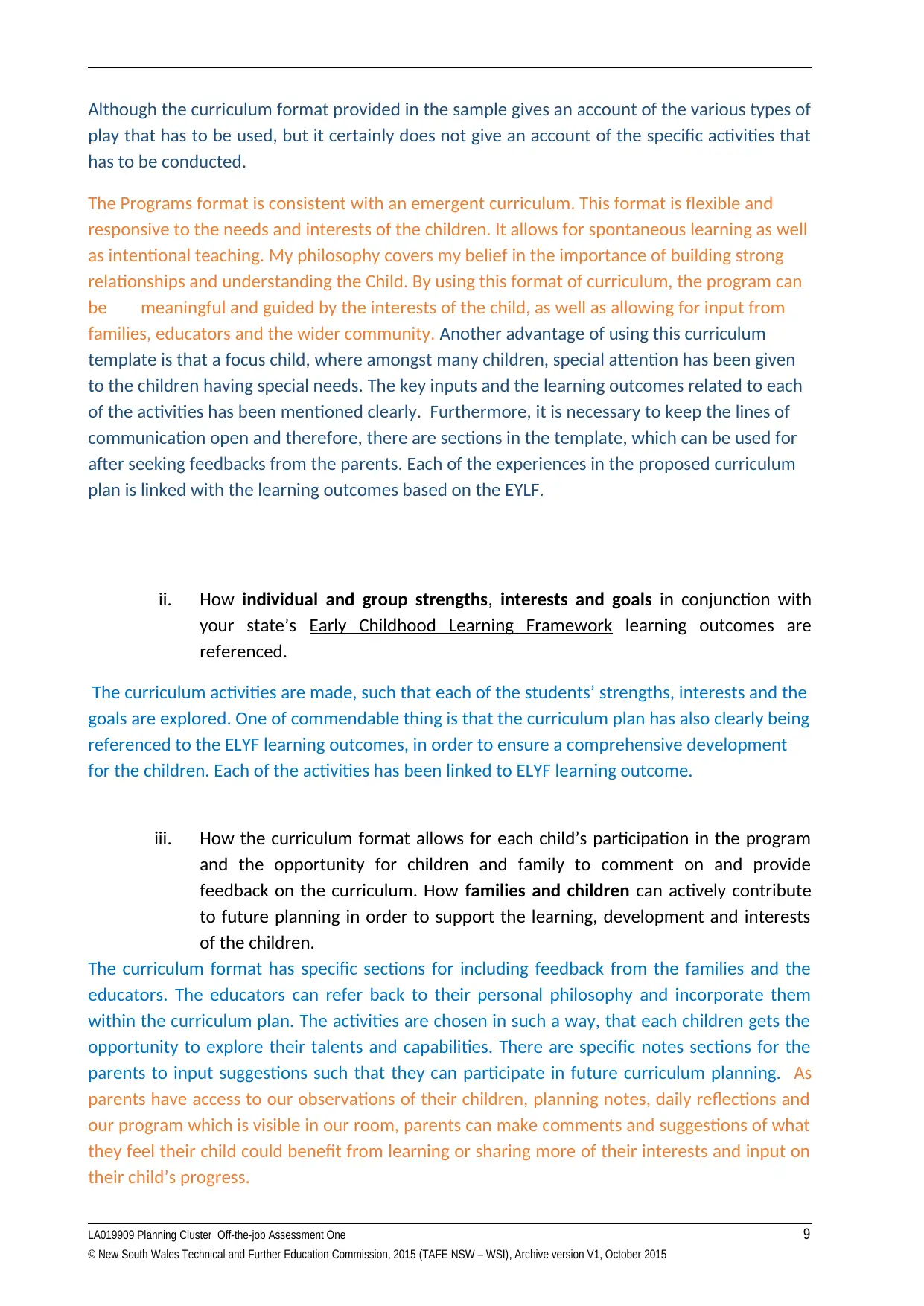
Although the curriculum format provided in the sample gives an account of the various types of
play that has to be used, but it certainly does not give an account of the specific activities that
has to be conducted.
The Programs format is consistent with an emergent curriculum. This format is flexible and
responsive to the needs and interests of the children. It allows for spontaneous learning as well
as intentional teaching. My philosophy covers my belief in the importance of building strong
relationships and understanding the Child. By using this format of curriculum, the program can
be meaningful and guided by the interests of the child, as well as allowing for input from
families, educators and the wider community. Another advantage of using this curriculum
template is that a focus child, where amongst many children, special attention has been given
to the children having special needs. The key inputs and the learning outcomes related to each
of the activities has been mentioned clearly. Furthermore, it is necessary to keep the lines of
communication open and therefore, there are sections in the template, which can be used for
after seeking feedbacks from the parents. Each of the experiences in the proposed curriculum
plan is linked with the learning outcomes based on the EYLF.
ii. How individual and group strengths, interests and goals in conjunction with
your state’s Early Childhood Learning Framework learning outcomes are
referenced.
The curriculum activities are made, such that each of the students’ strengths, interests and the
goals are explored. One of commendable thing is that the curriculum plan has also clearly being
referenced to the ELYF learning outcomes, in order to ensure a comprehensive development
for the children. Each of the activities has been linked to ELYF learning outcome.
iii. How the curriculum format allows for each child’s participation in the program
and the opportunity for children and family to comment on and provide
feedback on the curriculum. How families and children can actively contribute
to future planning in order to support the learning, development and interests
of the children.
The curriculum format has specific sections for including feedback from the families and the
educators. The educators can refer back to their personal philosophy and incorporate them
within the curriculum plan. The activities are chosen in such a way, that each children gets the
opportunity to explore their talents and capabilities. There are specific notes sections for the
parents to input suggestions such that they can participate in future curriculum planning. As
parents have access to our observations of their children, planning notes, daily reflections and
our program which is visible in our room, parents can make comments and suggestions of what
they feel their child could benefit from learning or sharing more of their interests and input on
their child’s progress.
LA019909 Planning Cluster Off-the-job Assessment One 9
© New South Wales Technical and Further Education Commission, 2015 (TAFE NSW – WSI), Archive version V1, October 2015
play that has to be used, but it certainly does not give an account of the specific activities that
has to be conducted.
The Programs format is consistent with an emergent curriculum. This format is flexible and
responsive to the needs and interests of the children. It allows for spontaneous learning as well
as intentional teaching. My philosophy covers my belief in the importance of building strong
relationships and understanding the Child. By using this format of curriculum, the program can
be meaningful and guided by the interests of the child, as well as allowing for input from
families, educators and the wider community. Another advantage of using this curriculum
template is that a focus child, where amongst many children, special attention has been given
to the children having special needs. The key inputs and the learning outcomes related to each
of the activities has been mentioned clearly. Furthermore, it is necessary to keep the lines of
communication open and therefore, there are sections in the template, which can be used for
after seeking feedbacks from the parents. Each of the experiences in the proposed curriculum
plan is linked with the learning outcomes based on the EYLF.
ii. How individual and group strengths, interests and goals in conjunction with
your state’s Early Childhood Learning Framework learning outcomes are
referenced.
The curriculum activities are made, such that each of the students’ strengths, interests and the
goals are explored. One of commendable thing is that the curriculum plan has also clearly being
referenced to the ELYF learning outcomes, in order to ensure a comprehensive development
for the children. Each of the activities has been linked to ELYF learning outcome.
iii. How the curriculum format allows for each child’s participation in the program
and the opportunity for children and family to comment on and provide
feedback on the curriculum. How families and children can actively contribute
to future planning in order to support the learning, development and interests
of the children.
The curriculum format has specific sections for including feedback from the families and the
educators. The educators can refer back to their personal philosophy and incorporate them
within the curriculum plan. The activities are chosen in such a way, that each children gets the
opportunity to explore their talents and capabilities. There are specific notes sections for the
parents to input suggestions such that they can participate in future curriculum planning. As
parents have access to our observations of their children, planning notes, daily reflections and
our program which is visible in our room, parents can make comments and suggestions of what
they feel their child could benefit from learning or sharing more of their interests and input on
their child’s progress.
LA019909 Planning Cluster Off-the-job Assessment One 9
© New South Wales Technical and Further Education Commission, 2015 (TAFE NSW – WSI), Archive version V1, October 2015
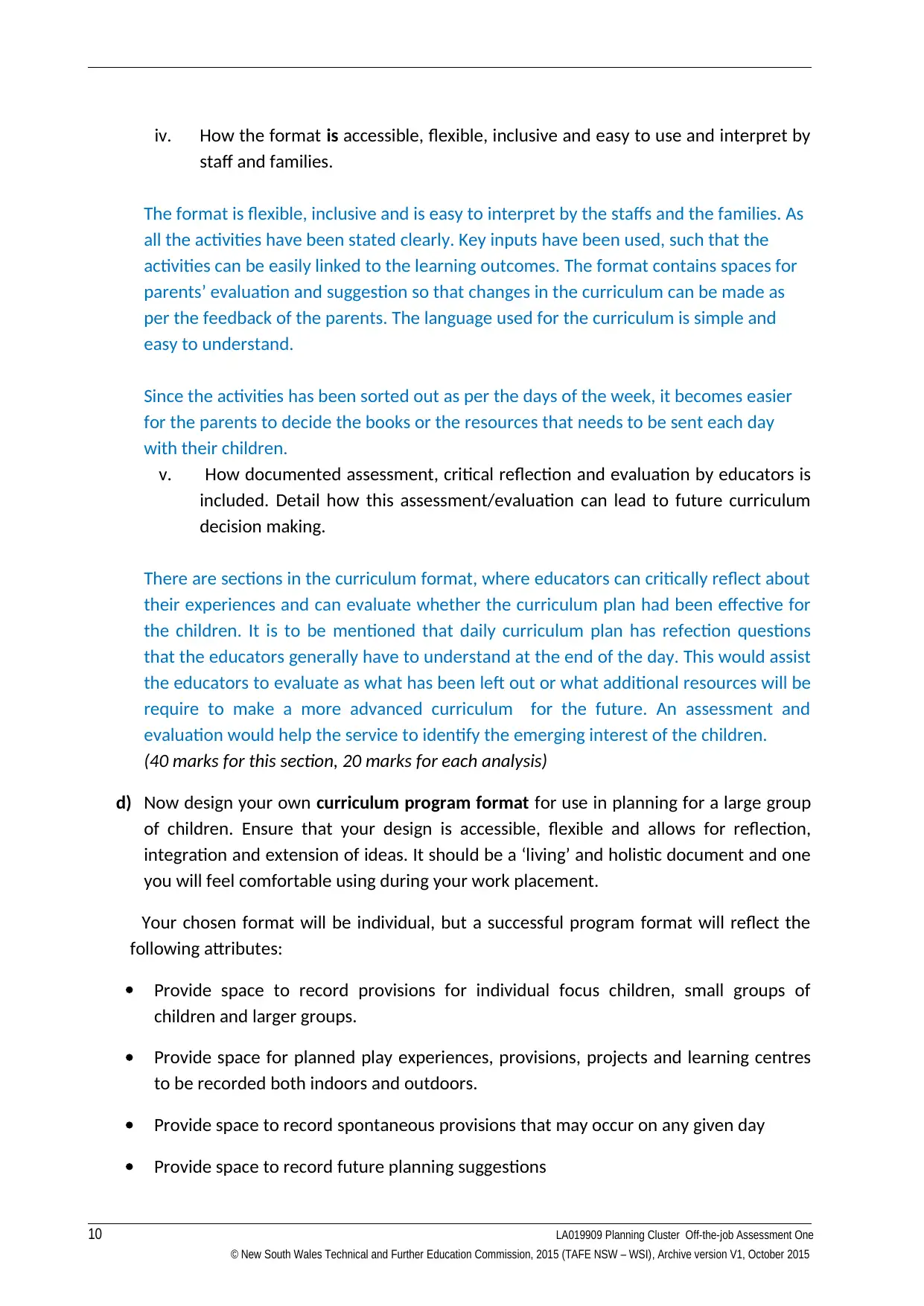
iv. How the format is accessible, flexible, inclusive and easy to use and interpret by
staff and families.
The format is flexible, inclusive and is easy to interpret by the staffs and the families. As
all the activities have been stated clearly. Key inputs have been used, such that the
activities can be easily linked to the learning outcomes. The format contains spaces for
parents’ evaluation and suggestion so that changes in the curriculum can be made as
per the feedback of the parents. The language used for the curriculum is simple and
easy to understand.
Since the activities has been sorted out as per the days of the week, it becomes easier
for the parents to decide the books or the resources that needs to be sent each day
with their children.
v. How documented assessment, critical reflection and evaluation by educators is
included. Detail how this assessment/evaluation can lead to future curriculum
decision making.
There are sections in the curriculum format, where educators can critically reflect about
their experiences and can evaluate whether the curriculum plan had been effective for
the children. It is to be mentioned that daily curriculum plan has refection questions
that the educators generally have to understand at the end of the day. This would assist
the educators to evaluate as what has been left out or what additional resources will be
require to make a more advanced curriculum for the future. An assessment and
evaluation would help the service to identify the emerging interest of the children.
(40 marks for this section, 20 marks for each analysis)
d) Now design your own curriculum program format for use in planning for a large group
of children. Ensure that your design is accessible, flexible and allows for reflection,
integration and extension of ideas. It should be a ‘living’ and holistic document and one
you will feel comfortable using during your work placement.
Your chosen format will be individual, but a successful program format will reflect the
following attributes:
Provide space to record provisions for individual focus children, small groups of
children and larger groups.
Provide space for planned play experiences, provisions, projects and learning centres
to be recorded both indoors and outdoors.
Provide space to record spontaneous provisions that may occur on any given day
Provide space to record future planning suggestions
10 LA019909 Planning Cluster Off-the-job Assessment One
© New South Wales Technical and Further Education Commission, 2015 (TAFE NSW – WSI), Archive version V1, October 2015
staff and families.
The format is flexible, inclusive and is easy to interpret by the staffs and the families. As
all the activities have been stated clearly. Key inputs have been used, such that the
activities can be easily linked to the learning outcomes. The format contains spaces for
parents’ evaluation and suggestion so that changes in the curriculum can be made as
per the feedback of the parents. The language used for the curriculum is simple and
easy to understand.
Since the activities has been sorted out as per the days of the week, it becomes easier
for the parents to decide the books or the resources that needs to be sent each day
with their children.
v. How documented assessment, critical reflection and evaluation by educators is
included. Detail how this assessment/evaluation can lead to future curriculum
decision making.
There are sections in the curriculum format, where educators can critically reflect about
their experiences and can evaluate whether the curriculum plan had been effective for
the children. It is to be mentioned that daily curriculum plan has refection questions
that the educators generally have to understand at the end of the day. This would assist
the educators to evaluate as what has been left out or what additional resources will be
require to make a more advanced curriculum for the future. An assessment and
evaluation would help the service to identify the emerging interest of the children.
(40 marks for this section, 20 marks for each analysis)
d) Now design your own curriculum program format for use in planning for a large group
of children. Ensure that your design is accessible, flexible and allows for reflection,
integration and extension of ideas. It should be a ‘living’ and holistic document and one
you will feel comfortable using during your work placement.
Your chosen format will be individual, but a successful program format will reflect the
following attributes:
Provide space to record provisions for individual focus children, small groups of
children and larger groups.
Provide space for planned play experiences, provisions, projects and learning centres
to be recorded both indoors and outdoors.
Provide space to record spontaneous provisions that may occur on any given day
Provide space to record future planning suggestions
10 LA019909 Planning Cluster Off-the-job Assessment One
© New South Wales Technical and Further Education Commission, 2015 (TAFE NSW – WSI), Archive version V1, October 2015
Secure Best Marks with AI Grader
Need help grading? Try our AI Grader for instant feedback on your assignments.
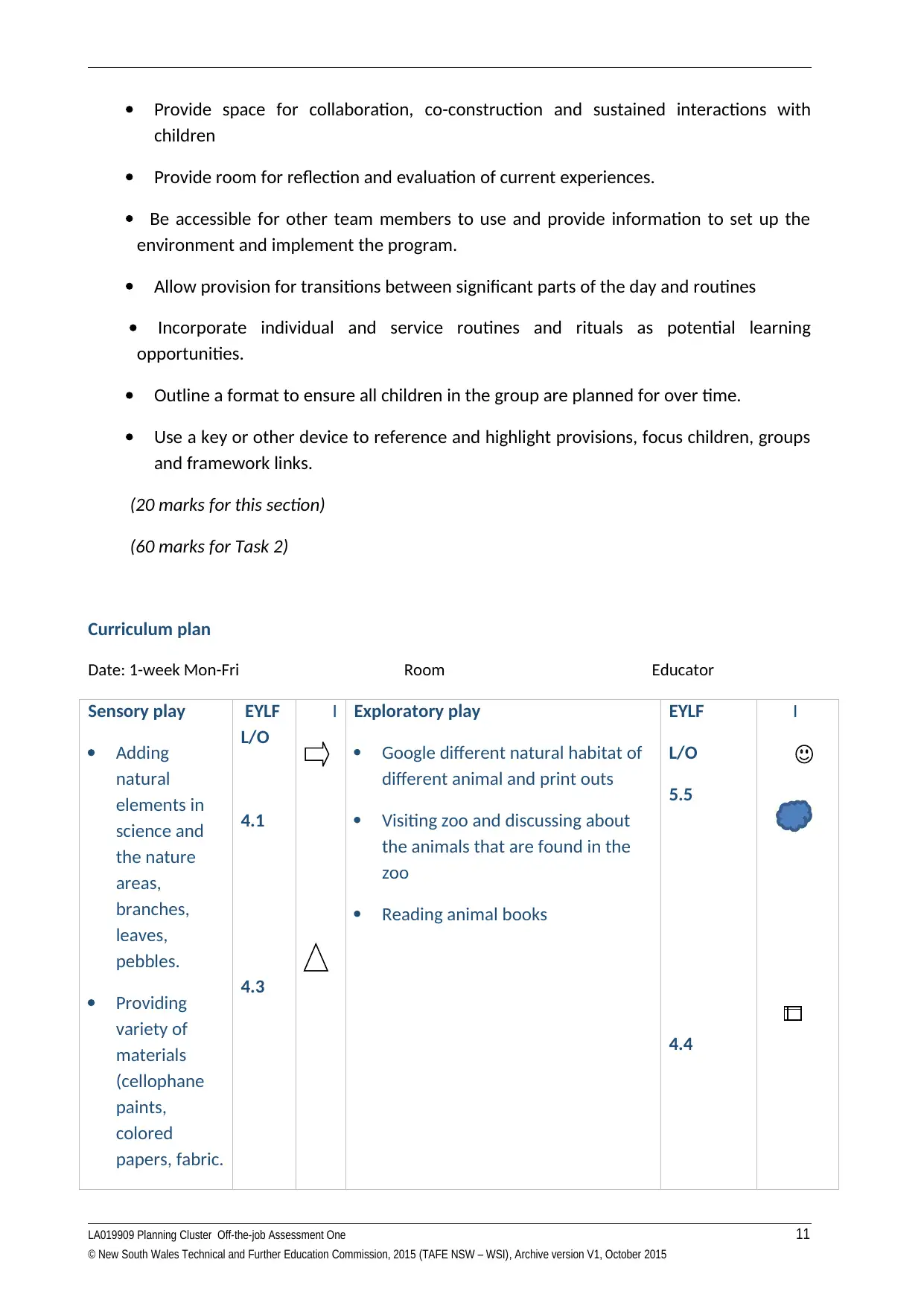
Provide space for collaboration, co-construction and sustained interactions with
children
Provide room for reflection and evaluation of current experiences.
Be accessible for other team members to use and provide information to set up the
environment and implement the program.
Allow provision for transitions between significant parts of the day and routines
Incorporate individual and service routines and rituals as potential learning
opportunities.
Outline a format to ensure all children in the group are planned for over time.
Use a key or other device to reference and highlight provisions, focus children, groups
and framework links.
(20 marks for this section)
(60 marks for Task 2)
Curriculum plan
Date: 1-week Mon-Fri Room Educator
Sensory play
Adding
natural
elements in
science and
the nature
areas,
branches,
leaves,
pebbles.
Providing
variety of
materials
(cellophane
paints,
colored
papers, fabric.
EYLF
L/O
4.1
4.3
I Exploratory play
Google different natural habitat of
different animal and print outs
Visiting zoo and discussing about
the animals that are found in the
zoo
Reading animal books
EYLF
L/O
5.5
4.4
I
LA019909 Planning Cluster Off-the-job Assessment One 11
© New South Wales Technical and Further Education Commission, 2015 (TAFE NSW – WSI), Archive version V1, October 2015
children
Provide room for reflection and evaluation of current experiences.
Be accessible for other team members to use and provide information to set up the
environment and implement the program.
Allow provision for transitions between significant parts of the day and routines
Incorporate individual and service routines and rituals as potential learning
opportunities.
Outline a format to ensure all children in the group are planned for over time.
Use a key or other device to reference and highlight provisions, focus children, groups
and framework links.
(20 marks for this section)
(60 marks for Task 2)
Curriculum plan
Date: 1-week Mon-Fri Room Educator
Sensory play
Adding
natural
elements in
science and
the nature
areas,
branches,
leaves,
pebbles.
Providing
variety of
materials
(cellophane
paints,
colored
papers, fabric.
EYLF
L/O
4.1
4.3
I Exploratory play
Google different natural habitat of
different animal and print outs
Visiting zoo and discussing about
the animals that are found in the
zoo
Reading animal books
EYLF
L/O
5.5
4.4
I
LA019909 Planning Cluster Off-the-job Assessment One 11
© New South Wales Technical and Further Education Commission, 2015 (TAFE NSW – WSI), Archive version V1, October 2015
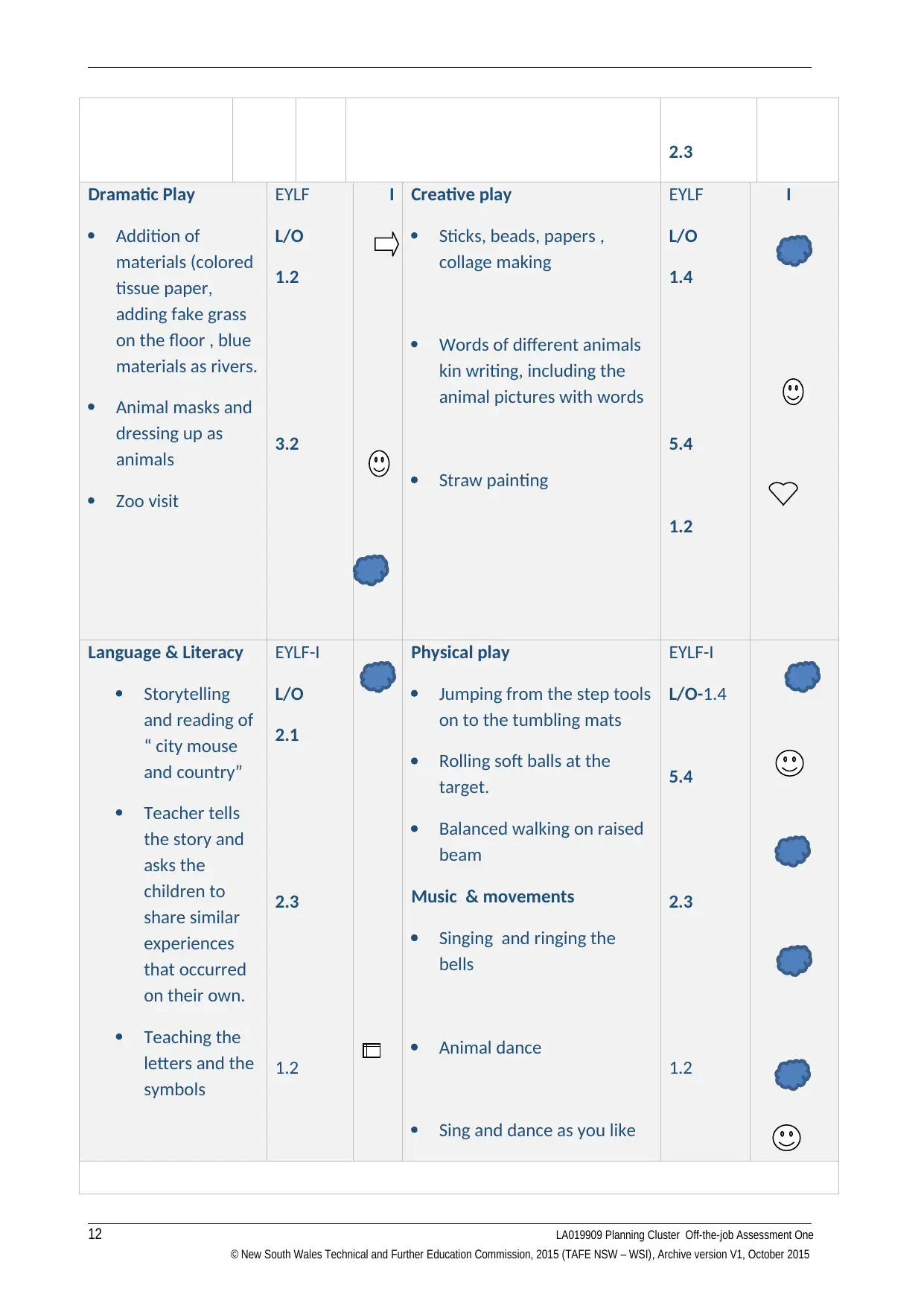
2.3
Dramatic Play
Addition of
materials (colored
tissue paper,
adding fake grass
on the floor , blue
materials as rivers.
Animal masks and
dressing up as
animals
Zoo visit
EYLF
L/O
1.2
3.2
I Creative play
Sticks, beads, papers ,
collage making
Words of different animals
kin writing, including the
animal pictures with words
Straw painting
EYLF
L/O
1.4
5.4
1.2
I
Language & Literacy
Storytelling
and reading of
“ city mouse
and country”
Teacher tells
the story and
asks the
children to
share similar
experiences
that occurred
on their own.
Teaching the
letters and the
symbols
EYLF-I
L/O
2.1
2.3
1.2
Physical play
Jumping from the step tools
on to the tumbling mats
Rolling soft balls at the
target.
Balanced walking on raised
beam
Music & movements
Singing and ringing the
bells
Animal dance
Sing and dance as you like
EYLF-I
L/O-1.4
5.4
2.3
1.2
12 LA019909 Planning Cluster Off-the-job Assessment One
© New South Wales Technical and Further Education Commission, 2015 (TAFE NSW – WSI), Archive version V1, October 2015
Dramatic Play
Addition of
materials (colored
tissue paper,
adding fake grass
on the floor , blue
materials as rivers.
Animal masks and
dressing up as
animals
Zoo visit
EYLF
L/O
1.2
3.2
I Creative play
Sticks, beads, papers ,
collage making
Words of different animals
kin writing, including the
animal pictures with words
Straw painting
EYLF
L/O
1.4
5.4
1.2
I
Language & Literacy
Storytelling
and reading of
“ city mouse
and country”
Teacher tells
the story and
asks the
children to
share similar
experiences
that occurred
on their own.
Teaching the
letters and the
symbols
EYLF-I
L/O
2.1
2.3
1.2
Physical play
Jumping from the step tools
on to the tumbling mats
Rolling soft balls at the
target.
Balanced walking on raised
beam
Music & movements
Singing and ringing the
bells
Animal dance
Sing and dance as you like
EYLF-I
L/O-1.4
5.4
2.3
1.2
12 LA019909 Planning Cluster Off-the-job Assessment One
© New South Wales Technical and Further Education Commission, 2015 (TAFE NSW – WSI), Archive version V1, October 2015
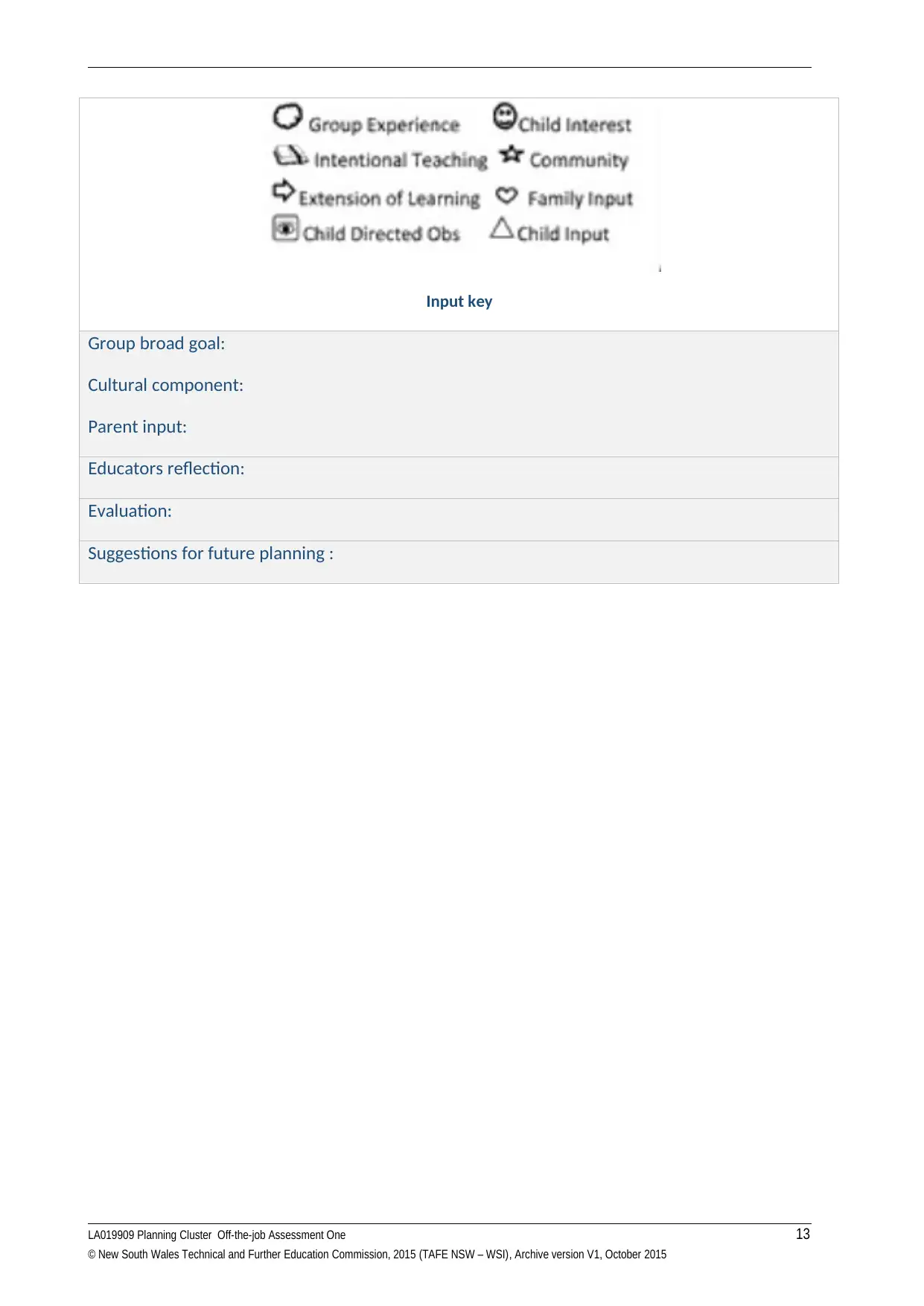
Input key
Group broad goal:
Cultural component:
Parent input:
Educators reflection:
Evaluation:
Suggestions for future planning :
LA019909 Planning Cluster Off-the-job Assessment One 13
© New South Wales Technical and Further Education Commission, 2015 (TAFE NSW – WSI), Archive version V1, October 2015
Group broad goal:
Cultural component:
Parent input:
Educators reflection:
Evaluation:
Suggestions for future planning :
LA019909 Planning Cluster Off-the-job Assessment One 13
© New South Wales Technical and Further Education Commission, 2015 (TAFE NSW – WSI), Archive version V1, October 2015
Paraphrase This Document
Need a fresh take? Get an instant paraphrase of this document with our AI Paraphraser
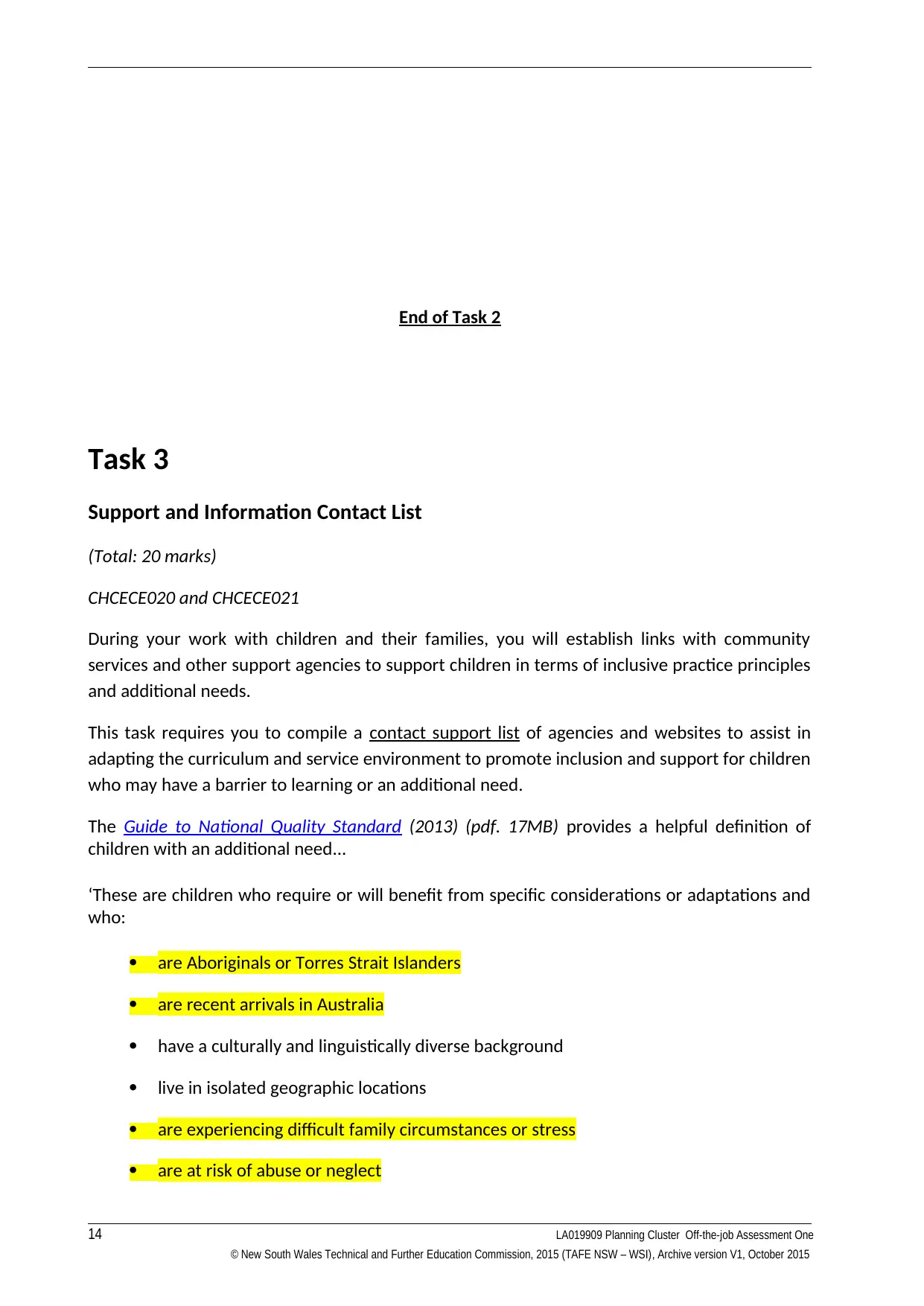
End of Task 2
Task 3
Support and Information Contact List
(Total: 20 marks)
CHCECE020 and CHCECE021
During your work with children and their families, you will establish links with community
services and other support agencies to support children in terms of inclusive practice principles
and additional needs.
This task requires you to compile a contact support list of agencies and websites to assist in
adapting the curriculum and service environment to promote inclusion and support for children
who may have a barrier to learning or an additional need.
The Guide to National Quality Standard (2013) (pdf. 17MB) provides a helpful definition of
children with an additional need...
‘These are children who require or will benefit from specific considerations or adaptations and
who:
are Aboriginals or Torres Strait Islanders
are recent arrivals in Australia
have a culturally and linguistically diverse background
live in isolated geographic locations
are experiencing difficult family circumstances or stress
are at risk of abuse or neglect
14 LA019909 Planning Cluster Off-the-job Assessment One
© New South Wales Technical and Further Education Commission, 2015 (TAFE NSW – WSI), Archive version V1, October 2015
Task 3
Support and Information Contact List
(Total: 20 marks)
CHCECE020 and CHCECE021
During your work with children and their families, you will establish links with community
services and other support agencies to support children in terms of inclusive practice principles
and additional needs.
This task requires you to compile a contact support list of agencies and websites to assist in
adapting the curriculum and service environment to promote inclusion and support for children
who may have a barrier to learning or an additional need.
The Guide to National Quality Standard (2013) (pdf. 17MB) provides a helpful definition of
children with an additional need...
‘These are children who require or will benefit from specific considerations or adaptations and
who:
are Aboriginals or Torres Strait Islanders
are recent arrivals in Australia
have a culturally and linguistically diverse background
live in isolated geographic locations
are experiencing difficult family circumstances or stress
are at risk of abuse or neglect
14 LA019909 Planning Cluster Off-the-job Assessment One
© New South Wales Technical and Further Education Commission, 2015 (TAFE NSW – WSI), Archive version V1, October 2015
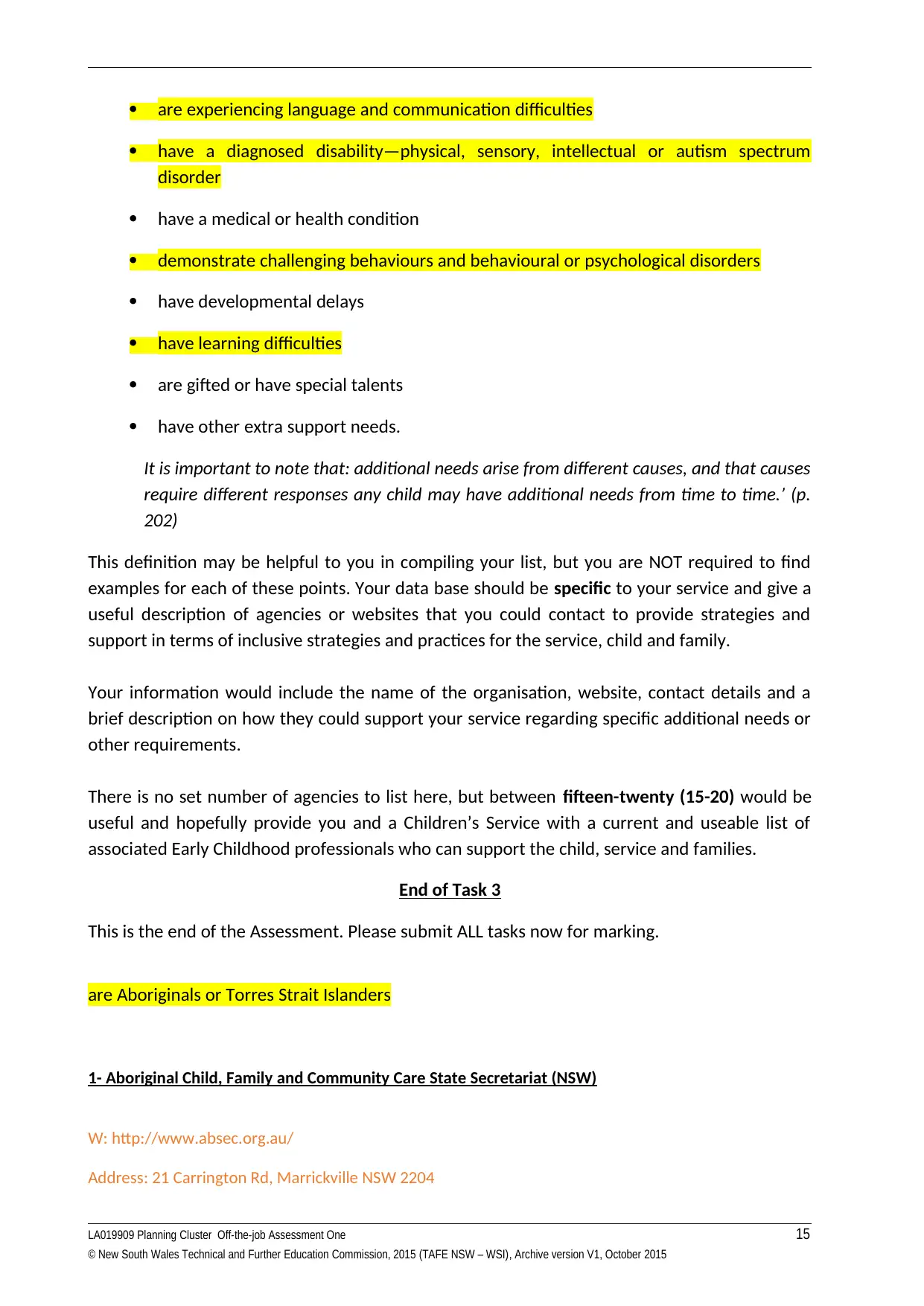
are experiencing language and communication difficulties
have a diagnosed disability—physical, sensory, intellectual or autism spectrum
disorder
have a medical or health condition
demonstrate challenging behaviours and behavioural or psychological disorders
have developmental delays
have learning difficulties
are gifted or have special talents
have other extra support needs.
It is important to note that: additional needs arise from different causes, and that causes
require different responses any child may have additional needs from time to time.’ (p.
202)
This definition may be helpful to you in compiling your list, but you are NOT required to find
examples for each of these points. Your data base should be specific to your service and give a
useful description of agencies or websites that you could contact to provide strategies and
support in terms of inclusive strategies and practices for the service, child and family.
Your information would include the name of the organisation, website, contact details and a
brief description on how they could support your service regarding specific additional needs or
other requirements.
There is no set number of agencies to list here, but between fifteen-twenty (15-20) would be
useful and hopefully provide you and a Children’s Service with a current and useable list of
associated Early Childhood professionals who can support the child, service and families.
End of Task 3
This is the end of the Assessment. Please submit ALL tasks now for marking.
are Aboriginals or Torres Strait Islanders
1- Aboriginal Child, Family and Community Care State Secretariat (NSW)
W: http://www.absec.org.au/
Address: 21 Carrington Rd, Marrickville NSW 2204
LA019909 Planning Cluster Off-the-job Assessment One 15
© New South Wales Technical and Further Education Commission, 2015 (TAFE NSW – WSI), Archive version V1, October 2015
have a diagnosed disability—physical, sensory, intellectual or autism spectrum
disorder
have a medical or health condition
demonstrate challenging behaviours and behavioural or psychological disorders
have developmental delays
have learning difficulties
are gifted or have special talents
have other extra support needs.
It is important to note that: additional needs arise from different causes, and that causes
require different responses any child may have additional needs from time to time.’ (p.
202)
This definition may be helpful to you in compiling your list, but you are NOT required to find
examples for each of these points. Your data base should be specific to your service and give a
useful description of agencies or websites that you could contact to provide strategies and
support in terms of inclusive strategies and practices for the service, child and family.
Your information would include the name of the organisation, website, contact details and a
brief description on how they could support your service regarding specific additional needs or
other requirements.
There is no set number of agencies to list here, but between fifteen-twenty (15-20) would be
useful and hopefully provide you and a Children’s Service with a current and useable list of
associated Early Childhood professionals who can support the child, service and families.
End of Task 3
This is the end of the Assessment. Please submit ALL tasks now for marking.
are Aboriginals or Torres Strait Islanders
1- Aboriginal Child, Family and Community Care State Secretariat (NSW)
W: http://www.absec.org.au/
Address: 21 Carrington Rd, Marrickville NSW 2204
LA019909 Planning Cluster Off-the-job Assessment One 15
© New South Wales Technical and Further Education Commission, 2015 (TAFE NSW – WSI), Archive version V1, October 2015
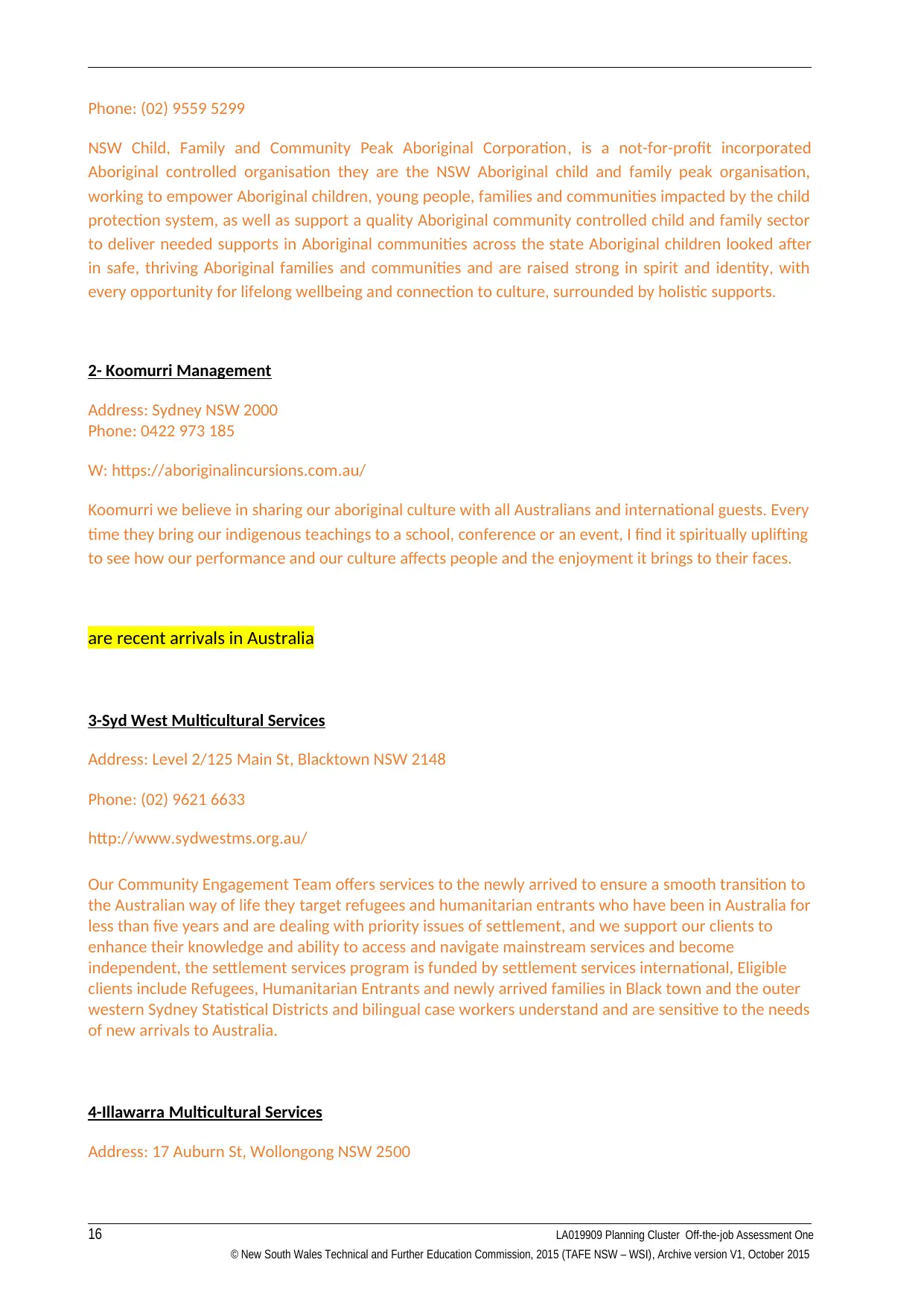
Phone: (02) 9559 5299
NSW Child, Family and Community Peak Aboriginal Corporation, is a not-for-profit incorporated
Aboriginal controlled organisation they are the NSW Aboriginal child and family peak organisation,
working to empower Aboriginal children, young people, families and communities impacted by the child
protection system, as well as support a quality Aboriginal community controlled child and family sector
to deliver needed supports in Aboriginal communities across the state Aboriginal children looked after
in safe, thriving Aboriginal families and communities and are raised strong in spirit and identity, with
every opportunity for lifelong wellbeing and connection to culture, surrounded by holistic supports.
2- Koomurri Management
Address: Sydney NSW 2000
Phone: 0422 973 185
W: https://aboriginalincursions.com.au/
Koomurri we believe in sharing our aboriginal culture with all Australians and international guests. Every
time they bring our indigenous teachings to a school, conference or an event, I find it spiritually uplifting
to see how our performance and our culture affects people and the enjoyment it brings to their faces.
are recent arrivals in Australia
3-Syd West Multicultural Services
Address: Level 2/125 Main St, Blacktown NSW 2148
Phone: (02) 9621 6633
http://www.sydwestms.org.au/
Our Community Engagement Team offers services to the newly arrived to ensure a smooth transition to
the Australian way of life they target refugees and humanitarian entrants who have been in Australia for
less than five years and are dealing with priority issues of settlement, and we support our clients to
enhance their knowledge and ability to access and navigate mainstream services and become
independent, the settlement services program is funded by settlement services international, Eligible
clients include Refugees, Humanitarian Entrants and newly arrived families in Black town and the outer
western Sydney Statistical Districts and bilingual case workers understand and are sensitive to the needs
of new arrivals to Australia.
4-Illawarra Multicultural Services
Address: 17 Auburn St, Wollongong NSW 2500
16 LA019909 Planning Cluster Off-the-job Assessment One
© New South Wales Technical and Further Education Commission, 2015 (TAFE NSW – WSI), Archive version V1, October 2015
NSW Child, Family and Community Peak Aboriginal Corporation, is a not-for-profit incorporated
Aboriginal controlled organisation they are the NSW Aboriginal child and family peak organisation,
working to empower Aboriginal children, young people, families and communities impacted by the child
protection system, as well as support a quality Aboriginal community controlled child and family sector
to deliver needed supports in Aboriginal communities across the state Aboriginal children looked after
in safe, thriving Aboriginal families and communities and are raised strong in spirit and identity, with
every opportunity for lifelong wellbeing and connection to culture, surrounded by holistic supports.
2- Koomurri Management
Address: Sydney NSW 2000
Phone: 0422 973 185
W: https://aboriginalincursions.com.au/
Koomurri we believe in sharing our aboriginal culture with all Australians and international guests. Every
time they bring our indigenous teachings to a school, conference or an event, I find it spiritually uplifting
to see how our performance and our culture affects people and the enjoyment it brings to their faces.
are recent arrivals in Australia
3-Syd West Multicultural Services
Address: Level 2/125 Main St, Blacktown NSW 2148
Phone: (02) 9621 6633
http://www.sydwestms.org.au/
Our Community Engagement Team offers services to the newly arrived to ensure a smooth transition to
the Australian way of life they target refugees and humanitarian entrants who have been in Australia for
less than five years and are dealing with priority issues of settlement, and we support our clients to
enhance their knowledge and ability to access and navigate mainstream services and become
independent, the settlement services program is funded by settlement services international, Eligible
clients include Refugees, Humanitarian Entrants and newly arrived families in Black town and the outer
western Sydney Statistical Districts and bilingual case workers understand and are sensitive to the needs
of new arrivals to Australia.
4-Illawarra Multicultural Services
Address: 17 Auburn St, Wollongong NSW 2500
16 LA019909 Planning Cluster Off-the-job Assessment One
© New South Wales Technical and Further Education Commission, 2015 (TAFE NSW – WSI), Archive version V1, October 2015
Secure Best Marks with AI Grader
Need help grading? Try our AI Grader for instant feedback on your assignments.
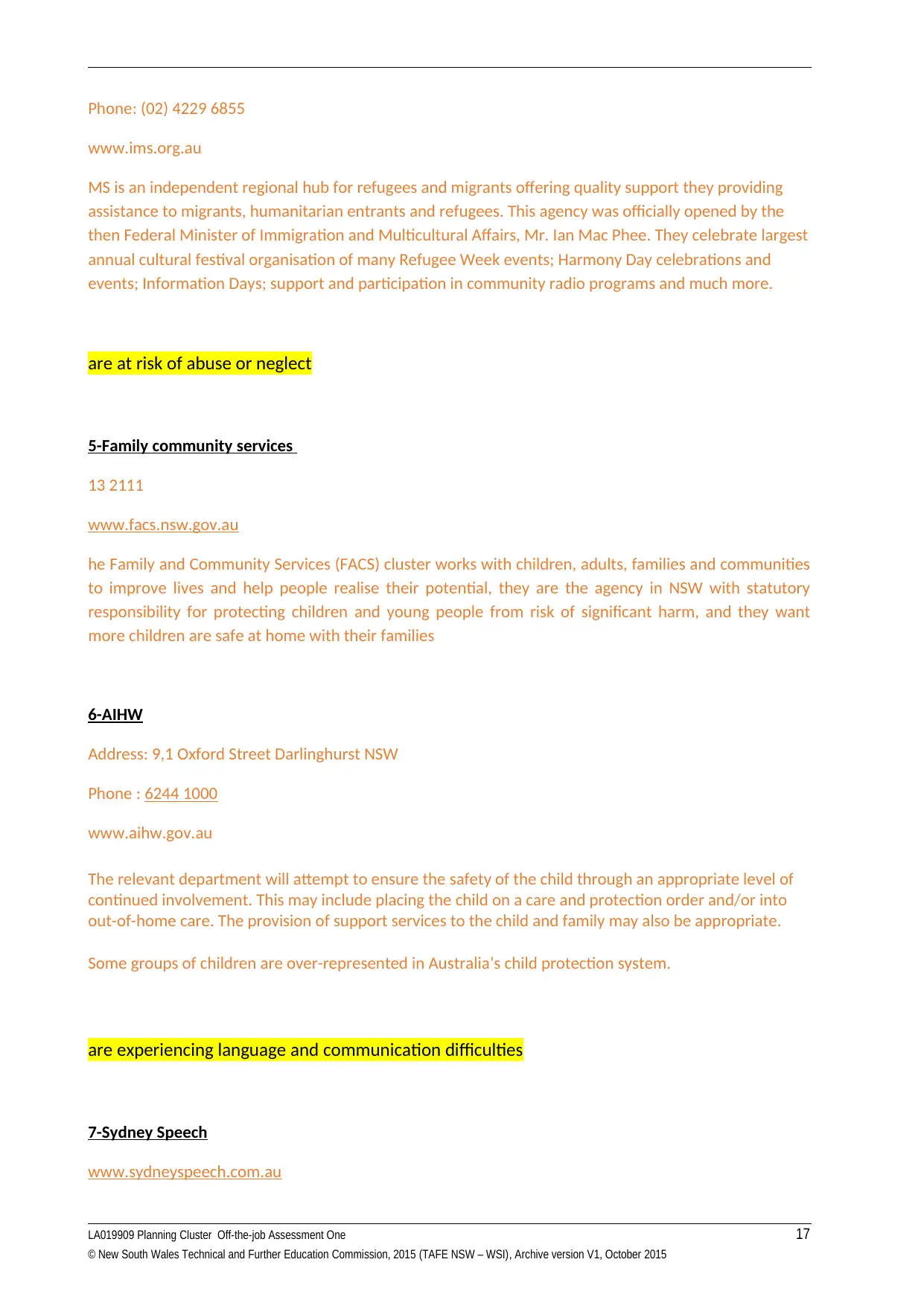
Phone: (02) 4229 6855
www.ims.org.au
MS is an independent regional hub for refugees and migrants offering quality support they providing
assistance to migrants, humanitarian entrants and refugees. This agency was officially opened by the
then Federal Minister of Immigration and Multicultural Affairs, Mr. Ian Mac Phee. They celebrate largest
annual cultural festival organisation of many Refugee Week events; Harmony Day celebrations and
events; Information Days; support and participation in community radio programs and much more.
are at risk of abuse or neglect
5-Family community services
13 2111
www.facs.nsw.gov.au
he Family and Community Services (FACS) cluster works with children, adults, families and communities
to improve lives and help people realise their potential, they are the agency in NSW with statutory
responsibility for protecting children and young people from risk of significant harm, and they want
more children are safe at home with their families
6-AIHW
Address: 9,1 Oxford Street Darlinghurst NSW
Phone : 6244 1000
www.aihw.gov.au
The relevant department will attempt to ensure the safety of the child through an appropriate level of
continued involvement. This may include placing the child on a care and protection order and/or into
out-of-home care. The provision of support services to the child and family may also be appropriate.
Some groups of children are over-represented in Australia’s child protection system.
are experiencing language and communication difficulties
7-Sydney Speech
www.sydneyspeech.com.au
LA019909 Planning Cluster Off-the-job Assessment One 17
© New South Wales Technical and Further Education Commission, 2015 (TAFE NSW – WSI), Archive version V1, October 2015
www.ims.org.au
MS is an independent regional hub for refugees and migrants offering quality support they providing
assistance to migrants, humanitarian entrants and refugees. This agency was officially opened by the
then Federal Minister of Immigration and Multicultural Affairs, Mr. Ian Mac Phee. They celebrate largest
annual cultural festival organisation of many Refugee Week events; Harmony Day celebrations and
events; Information Days; support and participation in community radio programs and much more.
are at risk of abuse or neglect
5-Family community services
13 2111
www.facs.nsw.gov.au
he Family and Community Services (FACS) cluster works with children, adults, families and communities
to improve lives and help people realise their potential, they are the agency in NSW with statutory
responsibility for protecting children and young people from risk of significant harm, and they want
more children are safe at home with their families
6-AIHW
Address: 9,1 Oxford Street Darlinghurst NSW
Phone : 6244 1000
www.aihw.gov.au
The relevant department will attempt to ensure the safety of the child through an appropriate level of
continued involvement. This may include placing the child on a care and protection order and/or into
out-of-home care. The provision of support services to the child and family may also be appropriate.
Some groups of children are over-represented in Australia’s child protection system.
are experiencing language and communication difficulties
7-Sydney Speech
www.sydneyspeech.com.au
LA019909 Planning Cluster Off-the-job Assessment One 17
© New South Wales Technical and Further Education Commission, 2015 (TAFE NSW – WSI), Archive version V1, October 2015
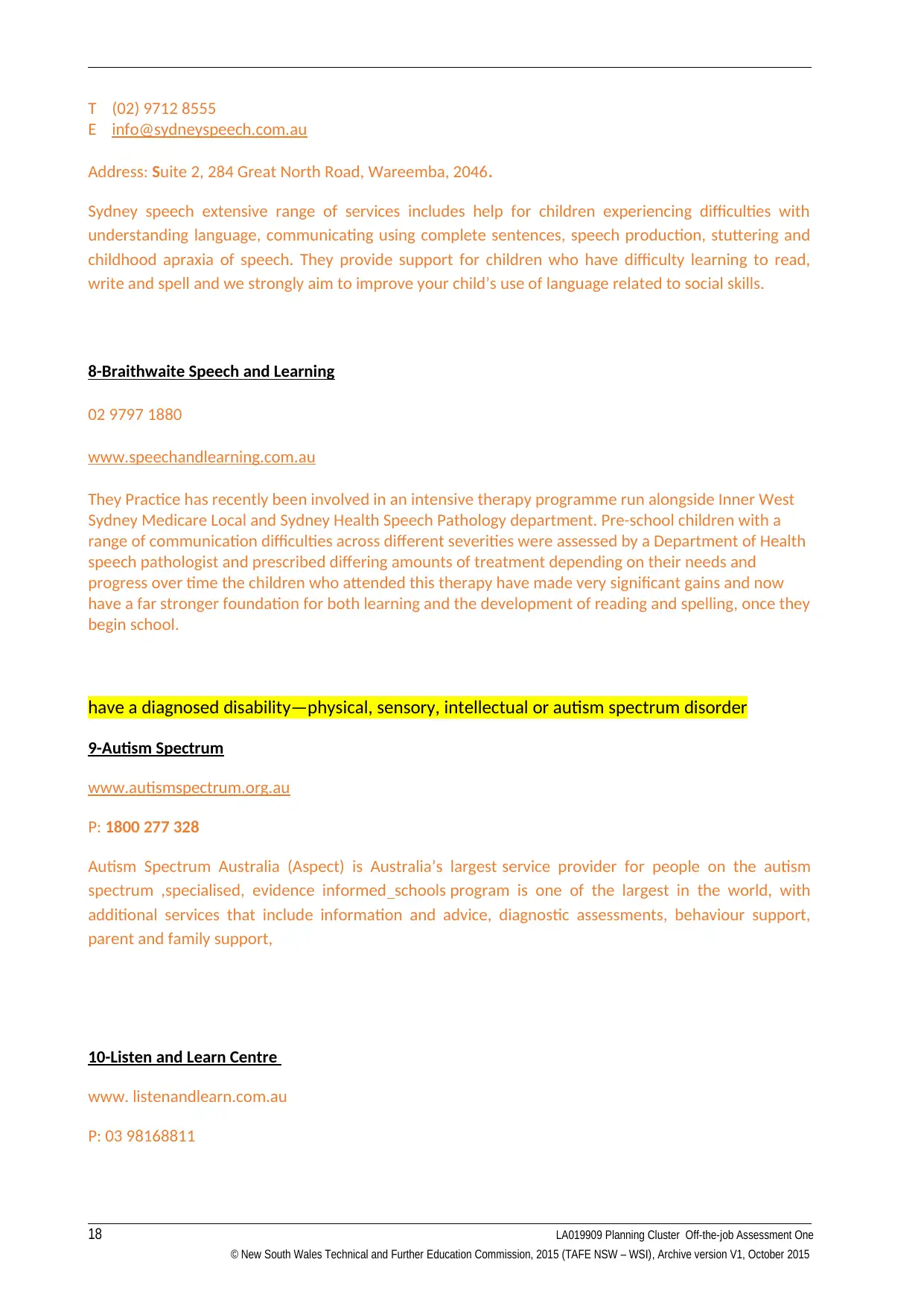
T (02) 9712 8555
E info@sydneyspeech.com.au
Address: Suite 2, 284 Great North Road, Wareemba, 2046.
Sydney speech extensive range of services includes help for children experiencing difficulties with
understanding language, communicating using complete sentences, speech production, stuttering and
childhood apraxia of speech. They provide support for children who have difficulty learning to read,
write and spell and we strongly aim to improve your child’s use of language related to social skills.
8-Braithwaite Speech and Learning
02 9797 1880
www.speechandlearning.com.au
They Practice has recently been involved in an intensive therapy programme run alongside Inner West
Sydney Medicare Local and Sydney Health Speech Pathology department. Pre-school children with a
range of communication difficulties across different severities were assessed by a Department of Health
speech pathologist and prescribed differing amounts of treatment depending on their needs and
progress over time the children who attended this therapy have made very significant gains and now
have a far stronger foundation for both learning and the development of reading and spelling, once they
begin school.
have a diagnosed disability—physical, sensory, intellectual or autism spectrum disorder
9-Autism Spectrum
www.autismspectrum.org.au
P: 1800 277 328
Autism Spectrum Australia (Aspect) is Australia’s largest service provider for people on the autism
spectrum ,specialised, evidence informed schools program is one of the largest in the world, with
additional services that include information and advice, diagnostic assessments, behaviour support,
parent and family support,
10-Listen and Learn Centre
www. listenandlearn.com.au
P: 03 98168811
18 LA019909 Planning Cluster Off-the-job Assessment One
© New South Wales Technical and Further Education Commission, 2015 (TAFE NSW – WSI), Archive version V1, October 2015
E info@sydneyspeech.com.au
Address: Suite 2, 284 Great North Road, Wareemba, 2046.
Sydney speech extensive range of services includes help for children experiencing difficulties with
understanding language, communicating using complete sentences, speech production, stuttering and
childhood apraxia of speech. They provide support for children who have difficulty learning to read,
write and spell and we strongly aim to improve your child’s use of language related to social skills.
8-Braithwaite Speech and Learning
02 9797 1880
www.speechandlearning.com.au
They Practice has recently been involved in an intensive therapy programme run alongside Inner West
Sydney Medicare Local and Sydney Health Speech Pathology department. Pre-school children with a
range of communication difficulties across different severities were assessed by a Department of Health
speech pathologist and prescribed differing amounts of treatment depending on their needs and
progress over time the children who attended this therapy have made very significant gains and now
have a far stronger foundation for both learning and the development of reading and spelling, once they
begin school.
have a diagnosed disability—physical, sensory, intellectual or autism spectrum disorder
9-Autism Spectrum
www.autismspectrum.org.au
P: 1800 277 328
Autism Spectrum Australia (Aspect) is Australia’s largest service provider for people on the autism
spectrum ,specialised, evidence informed schools program is one of the largest in the world, with
additional services that include information and advice, diagnostic assessments, behaviour support,
parent and family support,
10-Listen and Learn Centre
www. listenandlearn.com.au
P: 03 98168811
18 LA019909 Planning Cluster Off-the-job Assessment One
© New South Wales Technical and Further Education Commission, 2015 (TAFE NSW – WSI), Archive version V1, October 2015
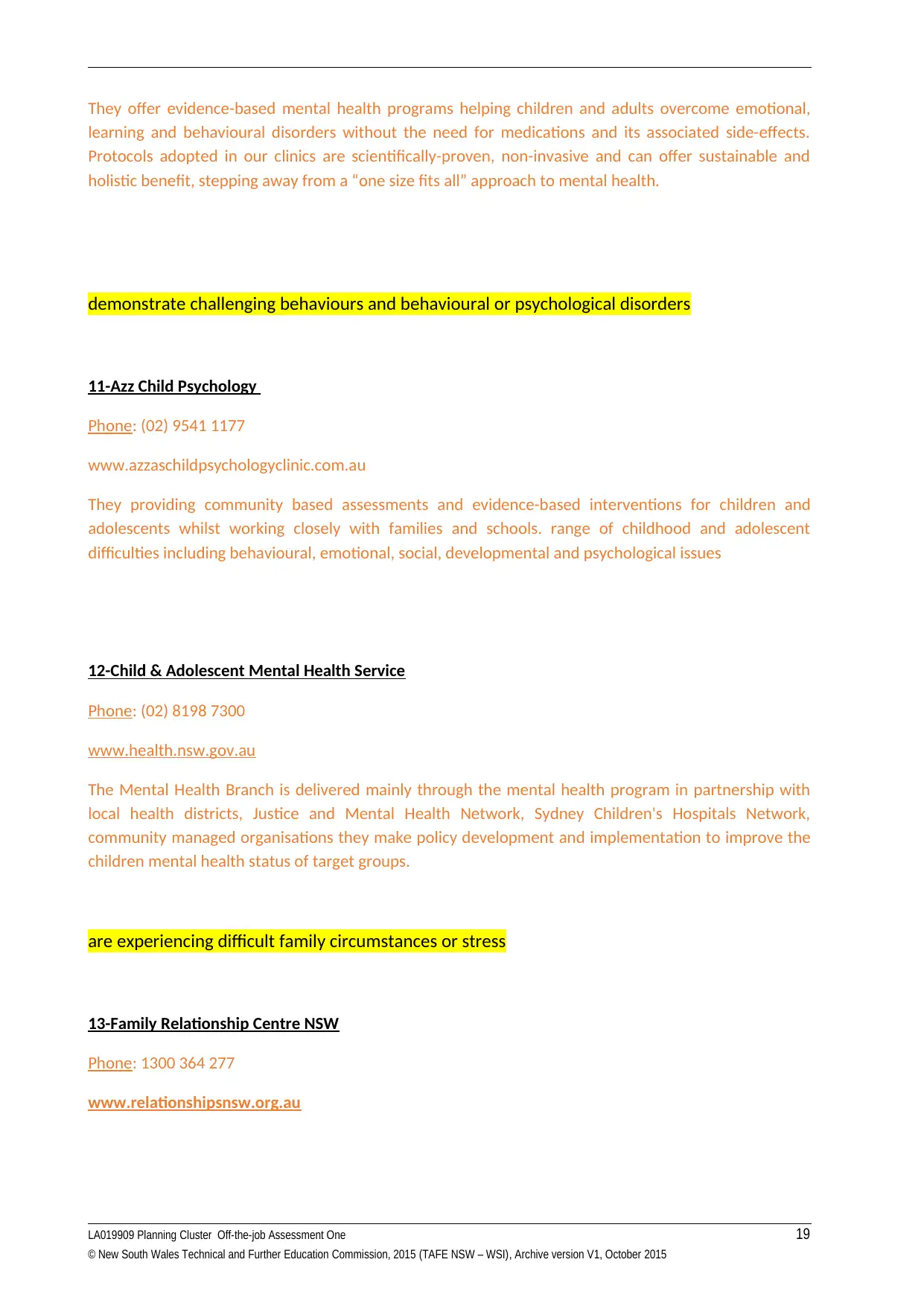
They offer evidence-based mental health programs helping children and adults overcome emotional,
learning and behavioural disorders without the need for medications and its associated side-effects.
Protocols adopted in our clinics are scientifically-proven, non-invasive and can offer sustainable and
holistic benefit, stepping away from a “one size fits all” approach to mental health.
demonstrate challenging behaviours and behavioural or psychological disorders
11-Azz Child Psychology
Phone: (02) 9541 1177
www.azzaschildpsychologyclinic.com.au
They providing community based assessments and evidence-based interventions for children and
adolescents whilst working closely with families and schools. range of childhood and adolescent
difficulties including behavioural, emotional, social, developmental and psychological issues
12-Child & Adolescent Mental Health Service
Phone: (02) 8198 7300
www.health.nsw.gov.au
The Mental Health Branch is delivered mainly through the mental health program in partnership with
local health districts, Justice and Mental Health Network, Sydney Children's Hospitals Network,
community managed organisations they make policy development and implementation to improve the
children mental health status of target groups.
are experiencing difficult family circumstances or stress
13-Family Relationship Centre NSW
Phone: 1300 364 277
www.relationshipsnsw.org.au
LA019909 Planning Cluster Off-the-job Assessment One 19
© New South Wales Technical and Further Education Commission, 2015 (TAFE NSW – WSI), Archive version V1, October 2015
learning and behavioural disorders without the need for medications and its associated side-effects.
Protocols adopted in our clinics are scientifically-proven, non-invasive and can offer sustainable and
holistic benefit, stepping away from a “one size fits all” approach to mental health.
demonstrate challenging behaviours and behavioural or psychological disorders
11-Azz Child Psychology
Phone: (02) 9541 1177
www.azzaschildpsychologyclinic.com.au
They providing community based assessments and evidence-based interventions for children and
adolescents whilst working closely with families and schools. range of childhood and adolescent
difficulties including behavioural, emotional, social, developmental and psychological issues
12-Child & Adolescent Mental Health Service
Phone: (02) 8198 7300
www.health.nsw.gov.au
The Mental Health Branch is delivered mainly through the mental health program in partnership with
local health districts, Justice and Mental Health Network, Sydney Children's Hospitals Network,
community managed organisations they make policy development and implementation to improve the
children mental health status of target groups.
are experiencing difficult family circumstances or stress
13-Family Relationship Centre NSW
Phone: 1300 364 277
www.relationshipsnsw.org.au
LA019909 Planning Cluster Off-the-job Assessment One 19
© New South Wales Technical and Further Education Commission, 2015 (TAFE NSW – WSI), Archive version V1, October 2015
Paraphrase This Document
Need a fresh take? Get an instant paraphrase of this document with our AI Paraphraser
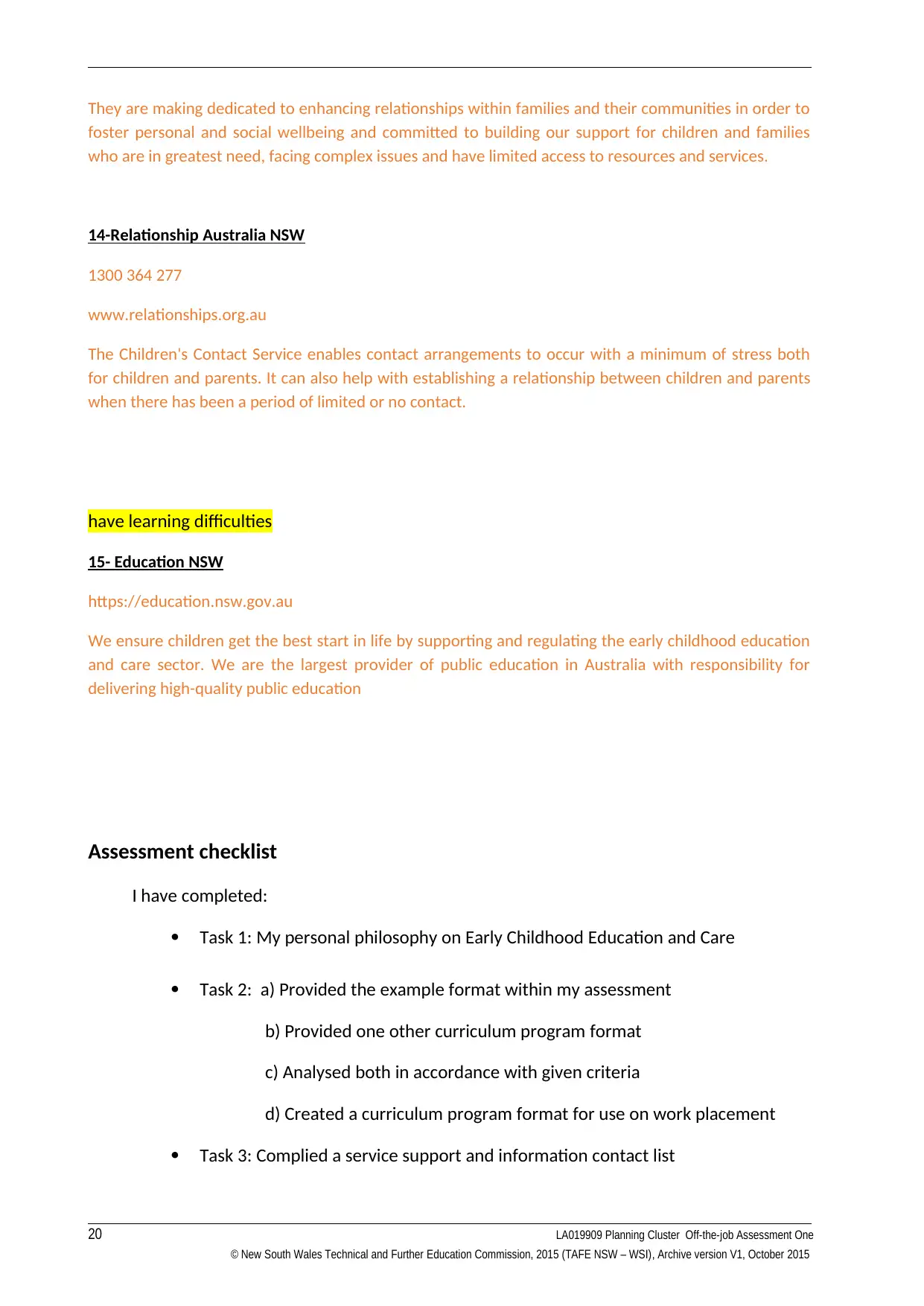
They are making dedicated to enhancing relationships within families and their communities in order to
foster personal and social wellbeing and committed to building our support for children and families
who are in greatest need, facing complex issues and have limited access to resources and services.
14-Relationship Australia NSW
1300 364 277
www.relationships.org.au
The Children's Contact Service enables contact arrangements to occur with a minimum of stress both
for children and parents. It can also help with establishing a relationship between children and parents
when there has been a period of limited or no contact.
have learning difficulties
15- Education NSW
https://education.nsw.gov.au
We ensure children get the best start in life by supporting and regulating the early childhood education
and care sector. We are the largest provider of public education in Australia with responsibility for
delivering high-quality public education
Assessment checklist
I have completed:
Task 1: My personal philosophy on Early Childhood Education and Care
Task 2: a) Provided the example format within my assessment
b) Provided one other curriculum program format
c) Analysed both in accordance with given criteria
d) Created a curriculum program format for use on work placement
Task 3: Complied a service support and information contact list
20 LA019909 Planning Cluster Off-the-job Assessment One
© New South Wales Technical and Further Education Commission, 2015 (TAFE NSW – WSI), Archive version V1, October 2015
foster personal and social wellbeing and committed to building our support for children and families
who are in greatest need, facing complex issues and have limited access to resources and services.
14-Relationship Australia NSW
1300 364 277
www.relationships.org.au
The Children's Contact Service enables contact arrangements to occur with a minimum of stress both
for children and parents. It can also help with establishing a relationship between children and parents
when there has been a period of limited or no contact.
have learning difficulties
15- Education NSW
https://education.nsw.gov.au
We ensure children get the best start in life by supporting and regulating the early childhood education
and care sector. We are the largest provider of public education in Australia with responsibility for
delivering high-quality public education
Assessment checklist
I have completed:
Task 1: My personal philosophy on Early Childhood Education and Care
Task 2: a) Provided the example format within my assessment
b) Provided one other curriculum program format
c) Analysed both in accordance with given criteria
d) Created a curriculum program format for use on work placement
Task 3: Complied a service support and information contact list
20 LA019909 Planning Cluster Off-the-job Assessment One
© New South Wales Technical and Further Education Commission, 2015 (TAFE NSW – WSI), Archive version V1, October 2015
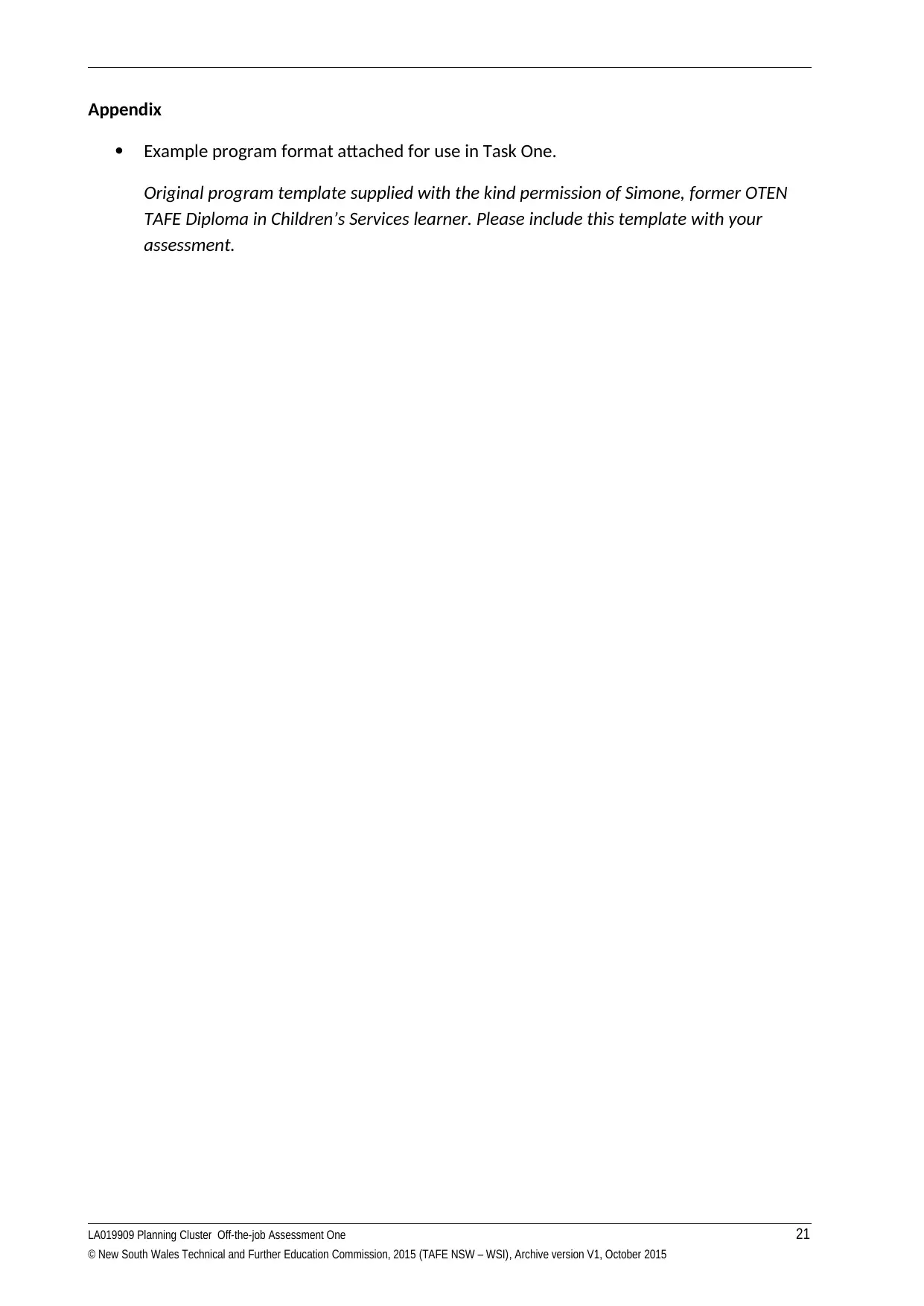
Appendix
Example program format attached for use in Task One.
Original program template supplied with the kind permission of Simone, former OTEN
TAFE Diploma in Children’s Services learner. Please include this template with your
assessment.
LA019909 Planning Cluster Off-the-job Assessment One 21
© New South Wales Technical and Further Education Commission, 2015 (TAFE NSW – WSI), Archive version V1, October 2015
Example program format attached for use in Task One.
Original program template supplied with the kind permission of Simone, former OTEN
TAFE Diploma in Children’s Services learner. Please include this template with your
assessment.
LA019909 Planning Cluster Off-the-job Assessment One 21
© New South Wales Technical and Further Education Commission, 2015 (TAFE NSW – WSI), Archive version V1, October 2015
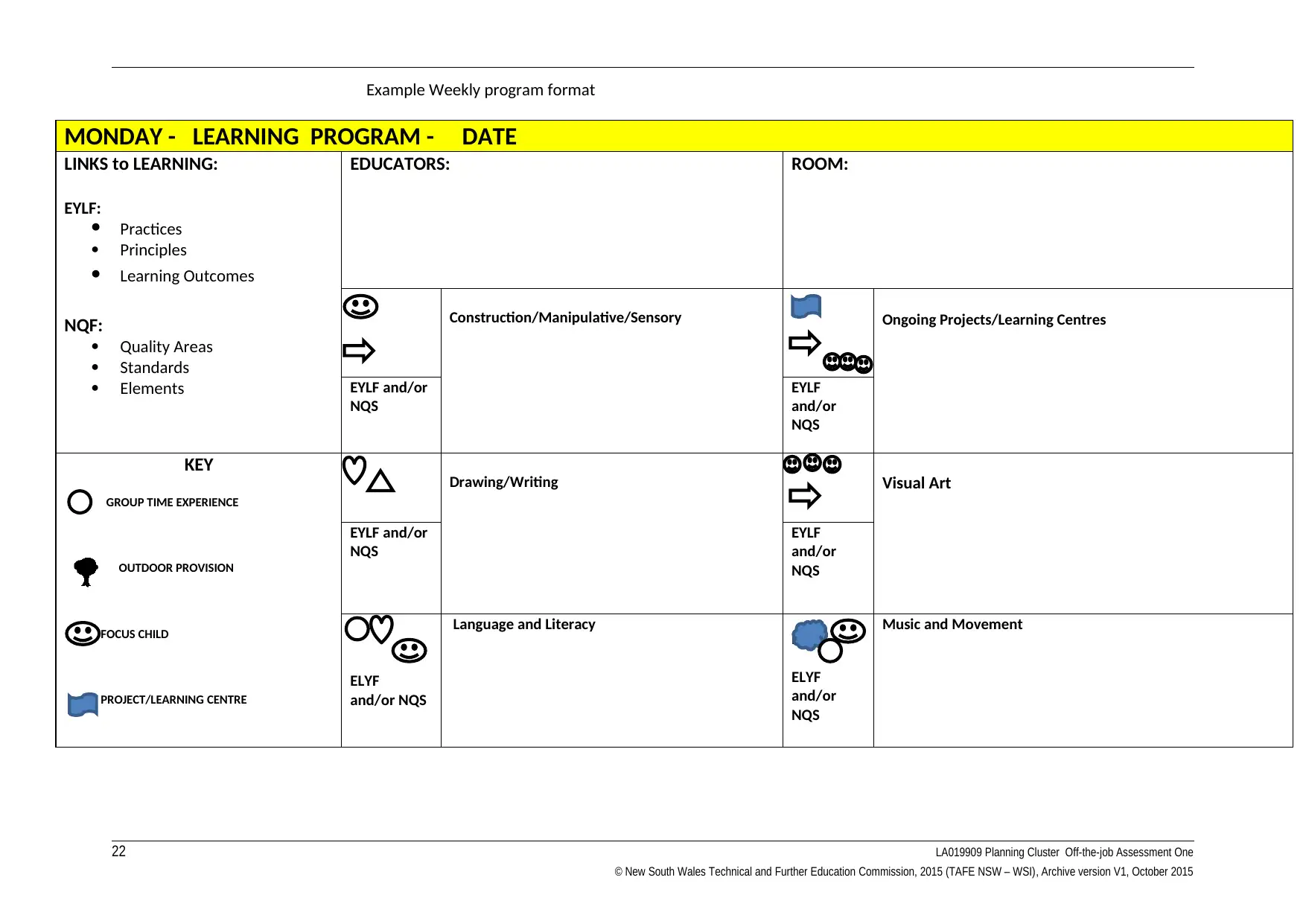
Example Weekly program format
MONDAY - LEARNING PROGRAM - DATE
LINKS to LEARNING:
EYLF:
Practices
Principles
Learning Outcomes
NQF:
Quality Areas
Standards
Elements
EDUCATORS: ROOM:
Construction/Manipulative/Sensory Ongoing Projects/Learning Centres
EYLF and/or
NQS
EYLF
and/or
NQS
KEY
GROUP TIME EXPERIENCE
OUTDOOR PROVISION
FOCUS CHILD
PROJECT/LEARNING CENTRE
Drawing/Writing Visual Art
EYLF and/or
NQS
EYLF
and/or
NQS
ELYF
and/or NQS
Language and Literacy EYLF
ELYF
and/or
NQS
Music and Movement
22 LA019909 Planning Cluster Off-the-job Assessment One
© New South Wales Technical and Further Education Commission, 2015 (TAFE NSW – WSI), Archive version V1, October 2015
MONDAY - LEARNING PROGRAM - DATE
LINKS to LEARNING:
EYLF:
Practices
Principles
Learning Outcomes
NQF:
Quality Areas
Standards
Elements
EDUCATORS: ROOM:
Construction/Manipulative/Sensory Ongoing Projects/Learning Centres
EYLF and/or
NQS
EYLF
and/or
NQS
KEY
GROUP TIME EXPERIENCE
OUTDOOR PROVISION
FOCUS CHILD
PROJECT/LEARNING CENTRE
Drawing/Writing Visual Art
EYLF and/or
NQS
EYLF
and/or
NQS
ELYF
and/or NQS
Language and Literacy EYLF
ELYF
and/or
NQS
Music and Movement
22 LA019909 Planning Cluster Off-the-job Assessment One
© New South Wales Technical and Further Education Commission, 2015 (TAFE NSW – WSI), Archive version V1, October 2015
Secure Best Marks with AI Grader
Need help grading? Try our AI Grader for instant feedback on your assignments.
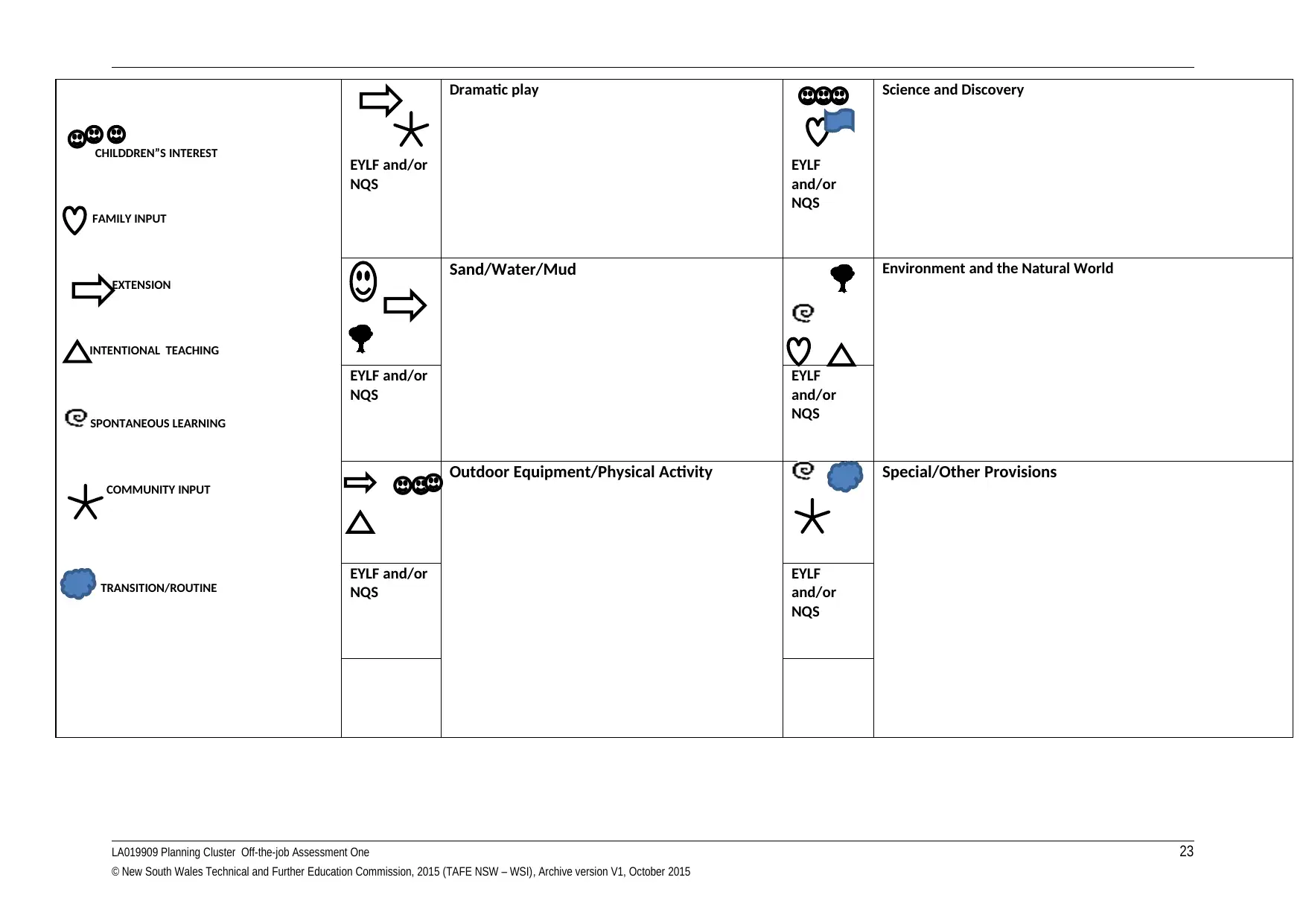
CHILDDREN”S INTEREST
FAMILY INPUT
EXTENSION
INTENTIONAL TEACHING
SPONTANEOUS LEARNING
COMMUNITY INPUT
TRANSITION/ROUTINE
EYLF and/or
NQS
Dramatic play
EYLF
and/or
NQS
Science and Discovery
Sand/Water/Mud Environment and the Natural World
EYLF and/or
NQS
EYLF
and/or
NQS
Outdoor Equipment/Physical Activity Special/Other Provisions
EYLF and/or
NQS
EYLF
and/or
NQS
LA019909 Planning Cluster Off-the-job Assessment One 23
© New South Wales Technical and Further Education Commission, 2015 (TAFE NSW – WSI), Archive version V1, October 2015
FAMILY INPUT
EXTENSION
INTENTIONAL TEACHING
SPONTANEOUS LEARNING
COMMUNITY INPUT
TRANSITION/ROUTINE
EYLF and/or
NQS
Dramatic play
EYLF
and/or
NQS
Science and Discovery
Sand/Water/Mud Environment and the Natural World
EYLF and/or
NQS
EYLF
and/or
NQS
Outdoor Equipment/Physical Activity Special/Other Provisions
EYLF and/or
NQS
EYLF
and/or
NQS
LA019909 Planning Cluster Off-the-job Assessment One 23
© New South Wales Technical and Further Education Commission, 2015 (TAFE NSW – WSI), Archive version V1, October 2015
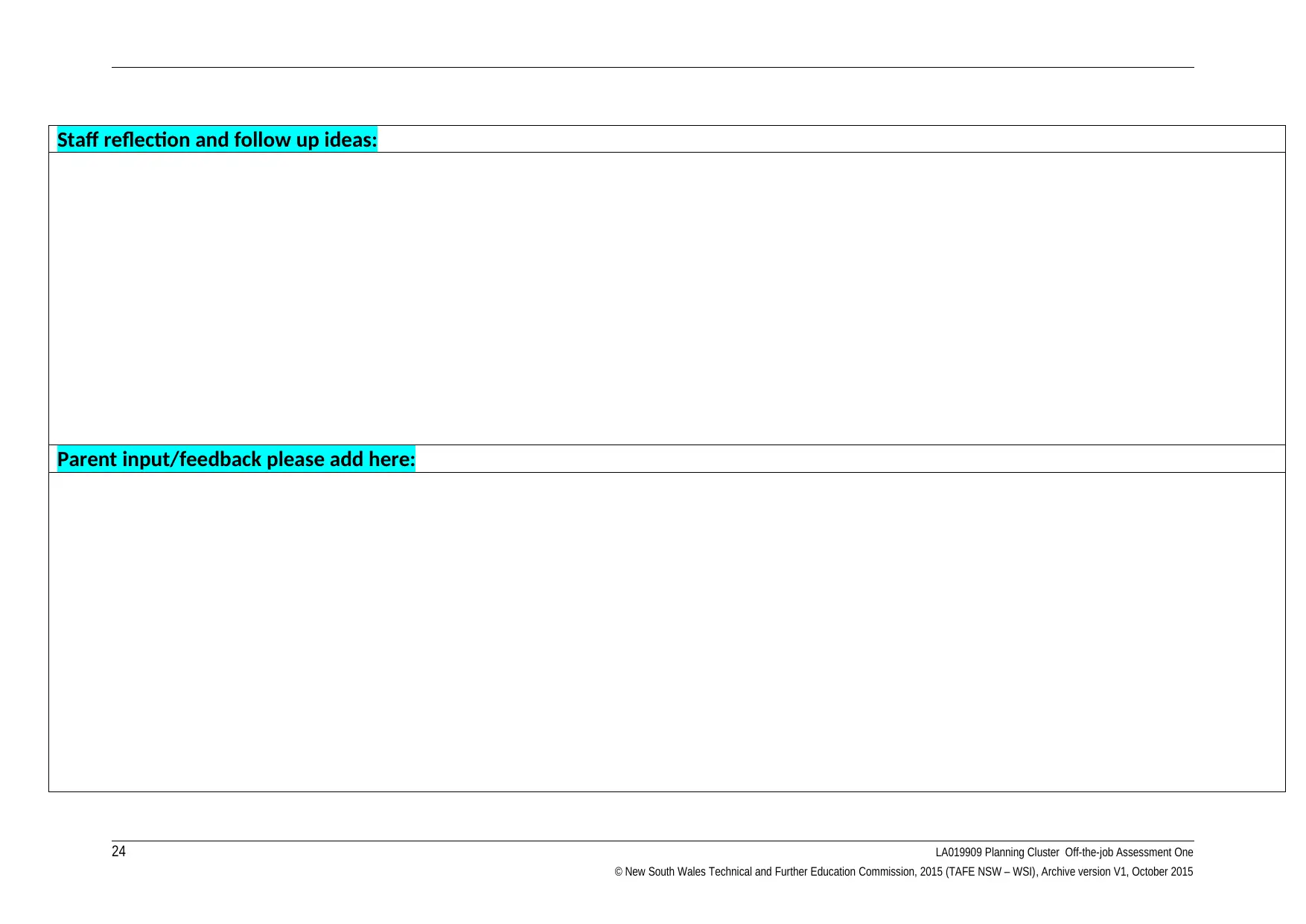
Staff reflection and follow up ideas:
Parent input/feedback please add here:
24 LA019909 Planning Cluster Off-the-job Assessment One
© New South Wales Technical and Further Education Commission, 2015 (TAFE NSW – WSI), Archive version V1, October 2015
Parent input/feedback please add here:
24 LA019909 Planning Cluster Off-the-job Assessment One
© New South Wales Technical and Further Education Commission, 2015 (TAFE NSW – WSI), Archive version V1, October 2015
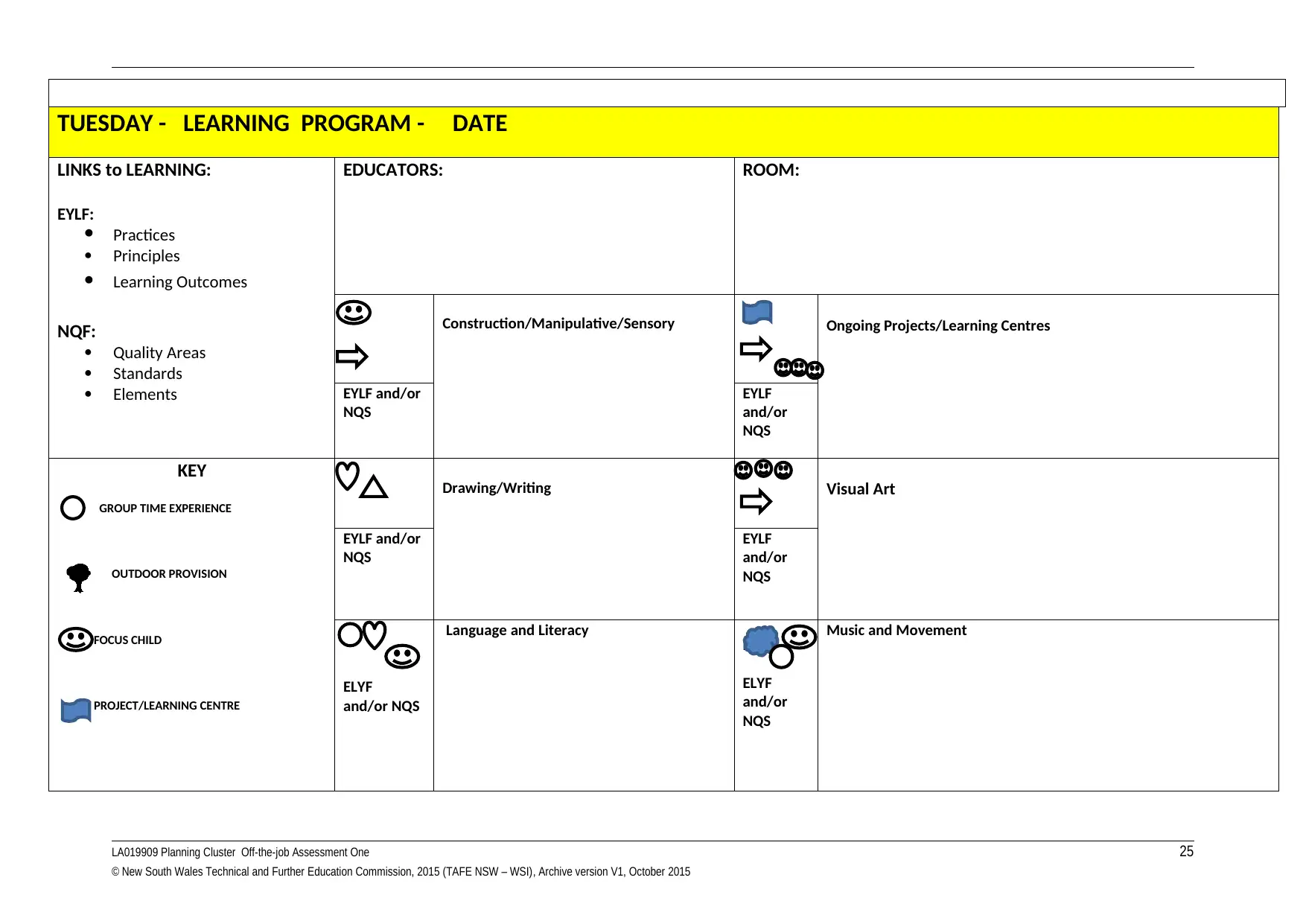
TUESDAY - LEARNING PROGRAM - DATE
LINKS to LEARNING:
EYLF:
Practices
Principles
Learning Outcomes
NQF:
Quality Areas
Standards
Elements
EDUCATORS: ROOM:
Construction/Manipulative/Sensory Ongoing Projects/Learning Centres
EYLF and/or
NQS
EYLF
and/or
NQS
KEY
GROUP TIME EXPERIENCE
OUTDOOR PROVISION
FOCUS CHILD
PROJECT/LEARNING CENTRE
Drawing/Writing Visual Art
EYLF and/or
NQS
EYLF
and/or
NQS
ELYF
and/or NQS
Language and Literacy EYLF
ELYF
and/or
NQS
Music and Movement
LA019909 Planning Cluster Off-the-job Assessment One 25
© New South Wales Technical and Further Education Commission, 2015 (TAFE NSW – WSI), Archive version V1, October 2015
LINKS to LEARNING:
EYLF:
Practices
Principles
Learning Outcomes
NQF:
Quality Areas
Standards
Elements
EDUCATORS: ROOM:
Construction/Manipulative/Sensory Ongoing Projects/Learning Centres
EYLF and/or
NQS
EYLF
and/or
NQS
KEY
GROUP TIME EXPERIENCE
OUTDOOR PROVISION
FOCUS CHILD
PROJECT/LEARNING CENTRE
Drawing/Writing Visual Art
EYLF and/or
NQS
EYLF
and/or
NQS
ELYF
and/or NQS
Language and Literacy EYLF
ELYF
and/or
NQS
Music and Movement
LA019909 Planning Cluster Off-the-job Assessment One 25
© New South Wales Technical and Further Education Commission, 2015 (TAFE NSW – WSI), Archive version V1, October 2015
Paraphrase This Document
Need a fresh take? Get an instant paraphrase of this document with our AI Paraphraser
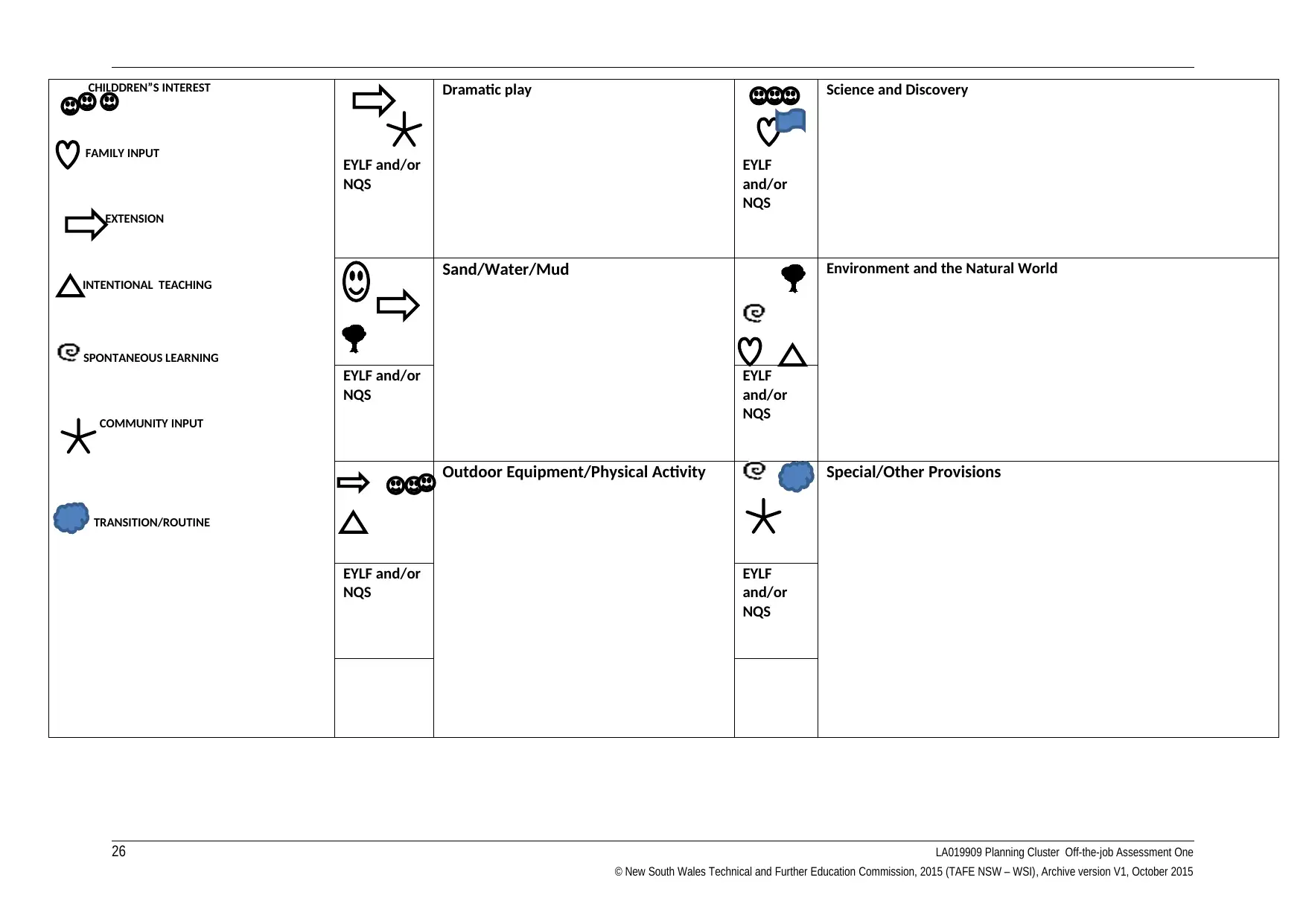
CHILDDREN”S INTEREST
FAMILY INPUT
EXTENSION
INTENTIONAL TEACHING
SPONTANEOUS LEARNING
COMMUNITY INPUT
TRANSITION/ROUTINE
EYLF and/or
NQS
Dramatic play
EYLF
and/or
NQS
Science and Discovery
Sand/Water/Mud Environment and the Natural World
EYLF and/or
NQS
EYLF
and/or
NQS
Outdoor Equipment/Physical Activity Special/Other Provisions
EYLF and/or
NQS
EYLF
and/or
NQS
26 LA019909 Planning Cluster Off-the-job Assessment One
© New South Wales Technical and Further Education Commission, 2015 (TAFE NSW – WSI), Archive version V1, October 2015
FAMILY INPUT
EXTENSION
INTENTIONAL TEACHING
SPONTANEOUS LEARNING
COMMUNITY INPUT
TRANSITION/ROUTINE
EYLF and/or
NQS
Dramatic play
EYLF
and/or
NQS
Science and Discovery
Sand/Water/Mud Environment and the Natural World
EYLF and/or
NQS
EYLF
and/or
NQS
Outdoor Equipment/Physical Activity Special/Other Provisions
EYLF and/or
NQS
EYLF
and/or
NQS
26 LA019909 Planning Cluster Off-the-job Assessment One
© New South Wales Technical and Further Education Commission, 2015 (TAFE NSW – WSI), Archive version V1, October 2015
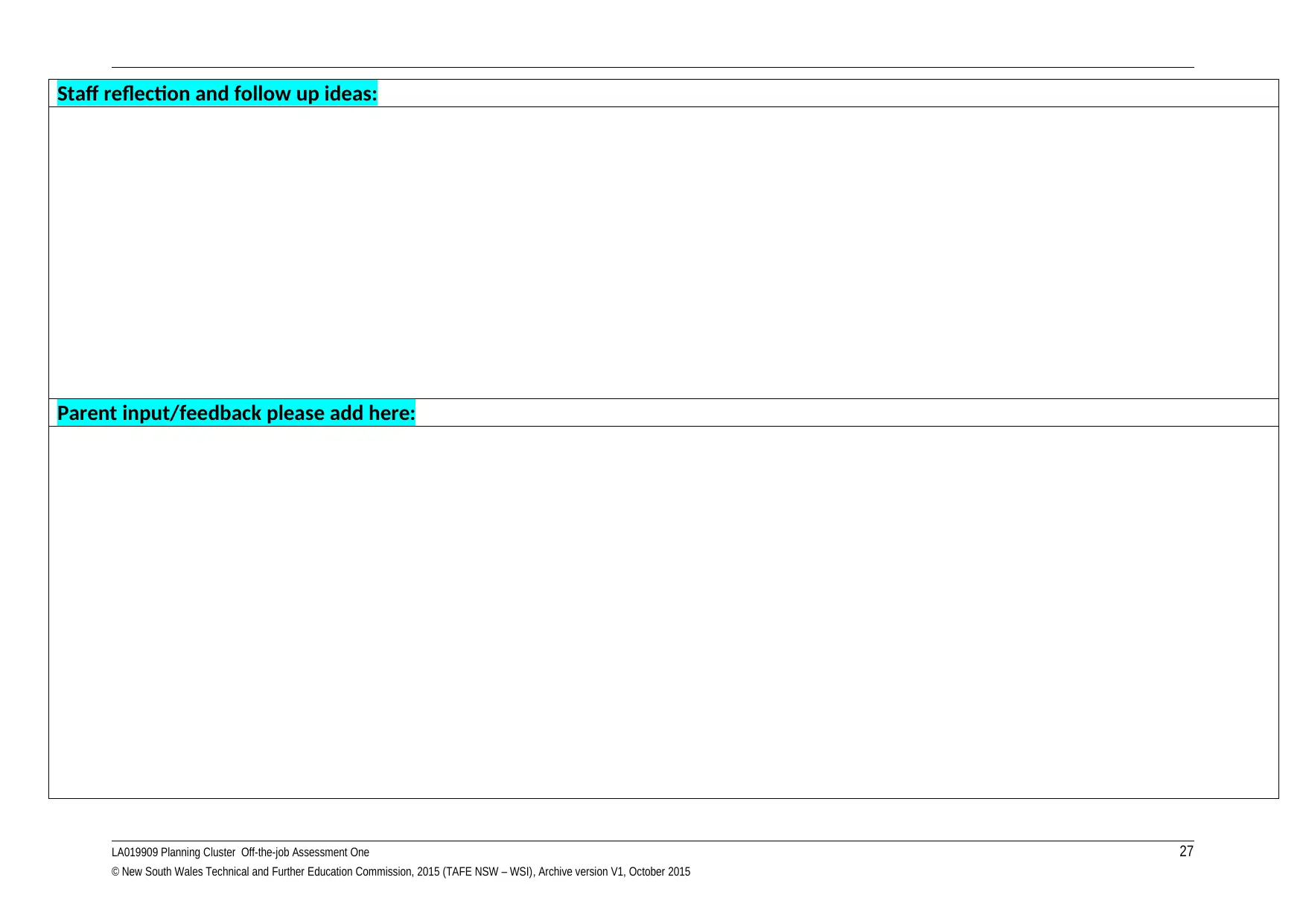
Staff reflection and follow up ideas:
Parent input/feedback please add here:
LA019909 Planning Cluster Off-the-job Assessment One 27
© New South Wales Technical and Further Education Commission, 2015 (TAFE NSW – WSI), Archive version V1, October 2015
Parent input/feedback please add here:
LA019909 Planning Cluster Off-the-job Assessment One 27
© New South Wales Technical and Further Education Commission, 2015 (TAFE NSW – WSI), Archive version V1, October 2015
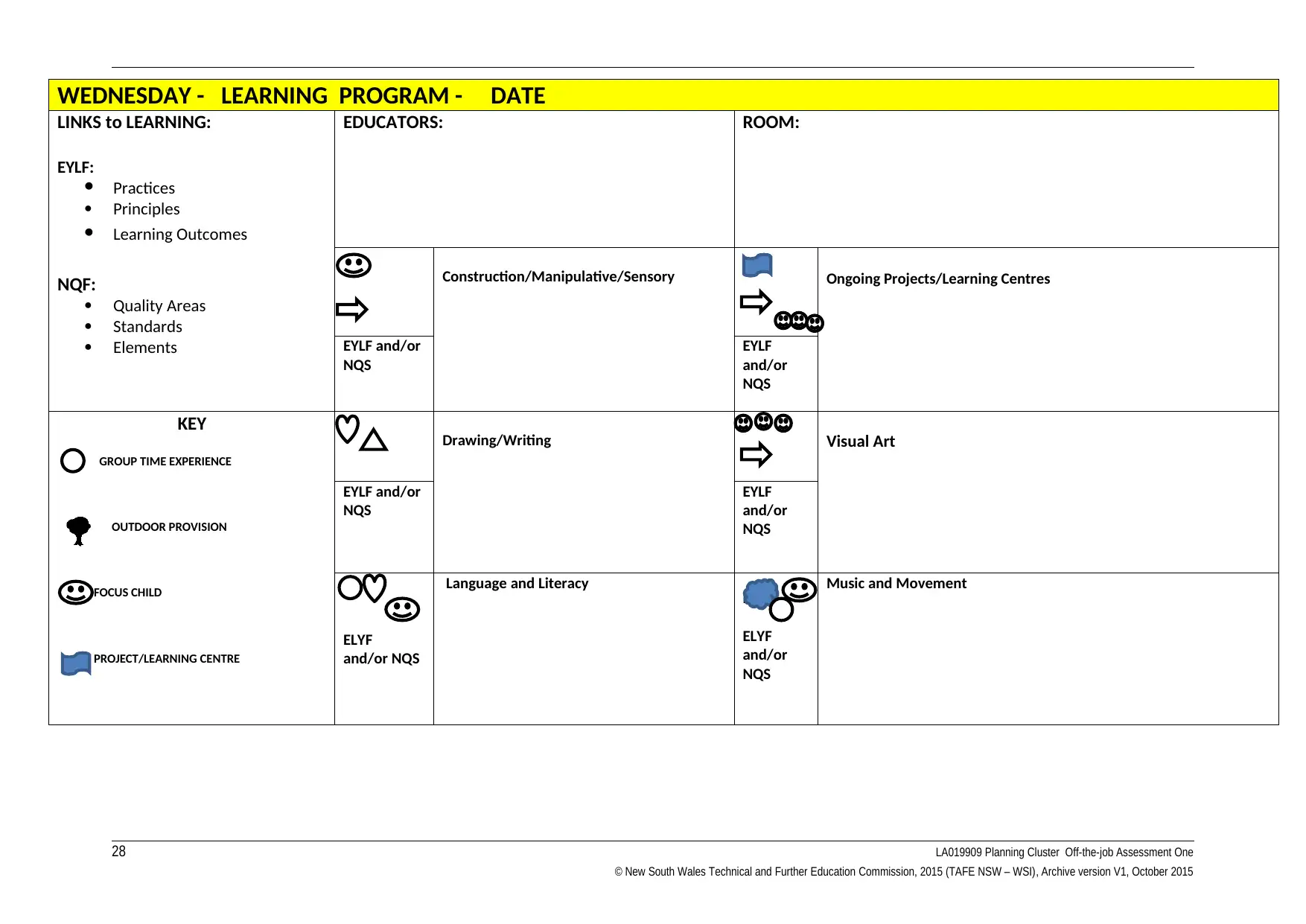
WEDNESDAY - LEARNING PROGRAM - DATE
LINKS to LEARNING:
EYLF:
Practices
Principles
Learning Outcomes
NQF:
Quality Areas
Standards
Elements
EDUCATORS: ROOM:
Construction/Manipulative/Sensory Ongoing Projects/Learning Centres
EYLF and/or
NQS
EYLF
and/or
NQS
KEY
GROUP TIME EXPERIENCE
OUTDOOR PROVISION
FOCUS CHILD
PROJECT/LEARNING CENTRE
Drawing/Writing Visual Art
EYLF and/or
NQS
EYLF
and/or
NQS
ELYF
and/or NQS
Language and Literacy EYLF
ELYF
and/or
NQS
Music and Movement
28 LA019909 Planning Cluster Off-the-job Assessment One
© New South Wales Technical and Further Education Commission, 2015 (TAFE NSW – WSI), Archive version V1, October 2015
LINKS to LEARNING:
EYLF:
Practices
Principles
Learning Outcomes
NQF:
Quality Areas
Standards
Elements
EDUCATORS: ROOM:
Construction/Manipulative/Sensory Ongoing Projects/Learning Centres
EYLF and/or
NQS
EYLF
and/or
NQS
KEY
GROUP TIME EXPERIENCE
OUTDOOR PROVISION
FOCUS CHILD
PROJECT/LEARNING CENTRE
Drawing/Writing Visual Art
EYLF and/or
NQS
EYLF
and/or
NQS
ELYF
and/or NQS
Language and Literacy EYLF
ELYF
and/or
NQS
Music and Movement
28 LA019909 Planning Cluster Off-the-job Assessment One
© New South Wales Technical and Further Education Commission, 2015 (TAFE NSW – WSI), Archive version V1, October 2015
Secure Best Marks with AI Grader
Need help grading? Try our AI Grader for instant feedback on your assignments.
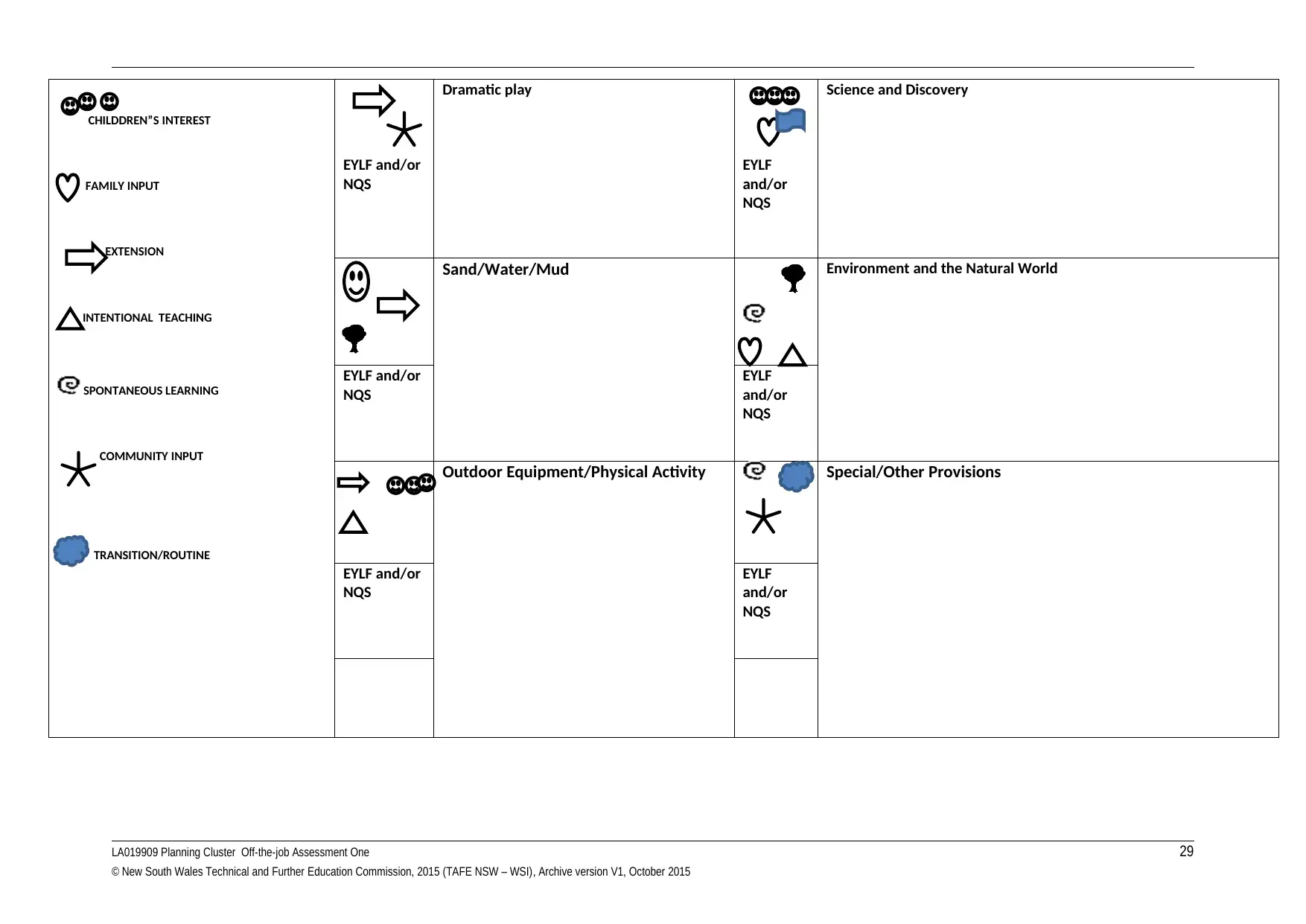
CHILDDREN”S INTEREST
FAMILY INPUT
EXTENSION
INTENTIONAL TEACHING
SPONTANEOUS LEARNING
COMMUNITY INPUT
TRANSITION/ROUTINE
EYLF and/or
NQS
Dramatic play
EYLF
and/or
NQS
Science and Discovery
Sand/Water/Mud Environment and the Natural World
EYLF and/or
NQS
EYLF
and/or
NQS
Outdoor Equipment/Physical Activity Special/Other Provisions
EYLF and/or
NQS
EYLF
and/or
NQS
LA019909 Planning Cluster Off-the-job Assessment One 29
© New South Wales Technical and Further Education Commission, 2015 (TAFE NSW – WSI), Archive version V1, October 2015
FAMILY INPUT
EXTENSION
INTENTIONAL TEACHING
SPONTANEOUS LEARNING
COMMUNITY INPUT
TRANSITION/ROUTINE
EYLF and/or
NQS
Dramatic play
EYLF
and/or
NQS
Science and Discovery
Sand/Water/Mud Environment and the Natural World
EYLF and/or
NQS
EYLF
and/or
NQS
Outdoor Equipment/Physical Activity Special/Other Provisions
EYLF and/or
NQS
EYLF
and/or
NQS
LA019909 Planning Cluster Off-the-job Assessment One 29
© New South Wales Technical and Further Education Commission, 2015 (TAFE NSW – WSI), Archive version V1, October 2015
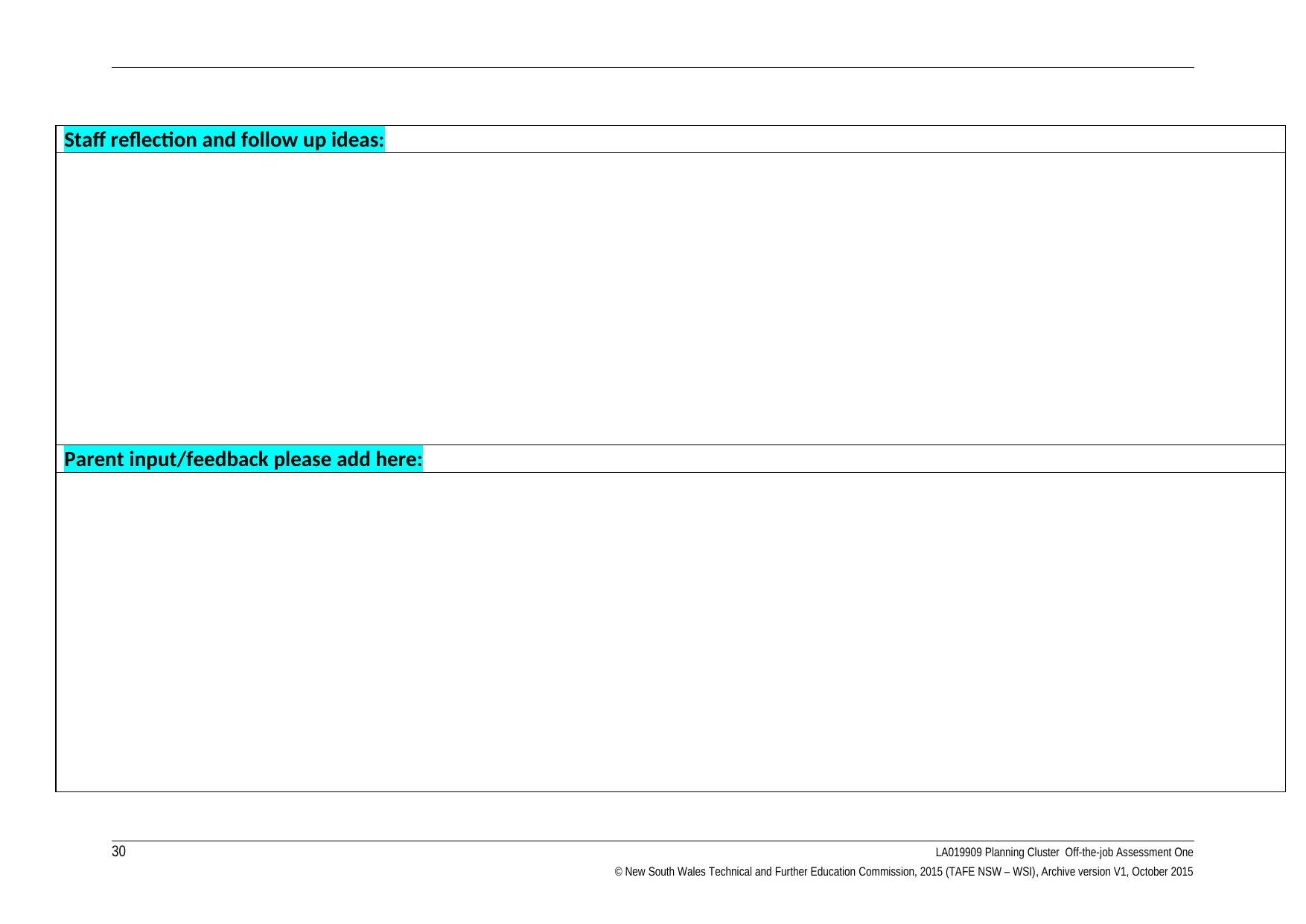
Staff reflection and follow up ideas:
Parent input/feedback please add here:
30 LA019909 Planning Cluster Off-the-job Assessment One
© New South Wales Technical and Further Education Commission, 2015 (TAFE NSW – WSI), Archive version V1, October 2015
Parent input/feedback please add here:
30 LA019909 Planning Cluster Off-the-job Assessment One
© New South Wales Technical and Further Education Commission, 2015 (TAFE NSW – WSI), Archive version V1, October 2015
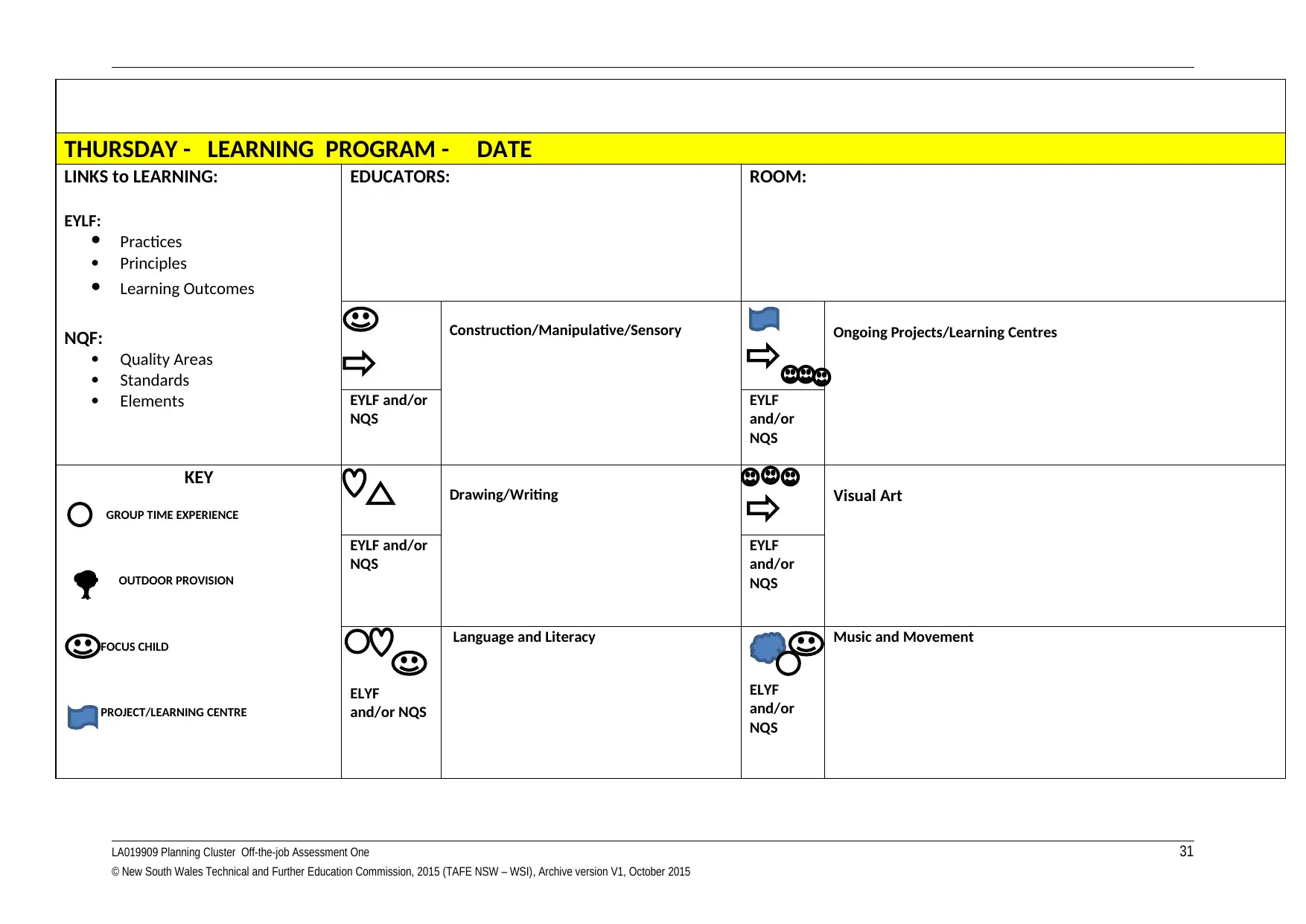
THURSDAY - LEARNING PROGRAM - DATE
LINKS to LEARNING:
EYLF:
Practices
Principles
Learning Outcomes
NQF:
Quality Areas
Standards
Elements
EDUCATORS: ROOM:
Construction/Manipulative/Sensory Ongoing Projects/Learning Centres
EYLF and/or
NQS
EYLF
and/or
NQS
KEY
GROUP TIME EXPERIENCE
OUTDOOR PROVISION
FOCUS CHILD
PROJECT/LEARNING CENTRE
Drawing/Writing Visual Art
EYLF and/or
NQS
EYLF
and/or
NQS
ELYF
and/or NQS
Language and Literacy EYLF
ELYF
and/or
NQS
Music and Movement
LA019909 Planning Cluster Off-the-job Assessment One 31
© New South Wales Technical and Further Education Commission, 2015 (TAFE NSW – WSI), Archive version V1, October 2015
LINKS to LEARNING:
EYLF:
Practices
Principles
Learning Outcomes
NQF:
Quality Areas
Standards
Elements
EDUCATORS: ROOM:
Construction/Manipulative/Sensory Ongoing Projects/Learning Centres
EYLF and/or
NQS
EYLF
and/or
NQS
KEY
GROUP TIME EXPERIENCE
OUTDOOR PROVISION
FOCUS CHILD
PROJECT/LEARNING CENTRE
Drawing/Writing Visual Art
EYLF and/or
NQS
EYLF
and/or
NQS
ELYF
and/or NQS
Language and Literacy EYLF
ELYF
and/or
NQS
Music and Movement
LA019909 Planning Cluster Off-the-job Assessment One 31
© New South Wales Technical and Further Education Commission, 2015 (TAFE NSW – WSI), Archive version V1, October 2015
Paraphrase This Document
Need a fresh take? Get an instant paraphrase of this document with our AI Paraphraser
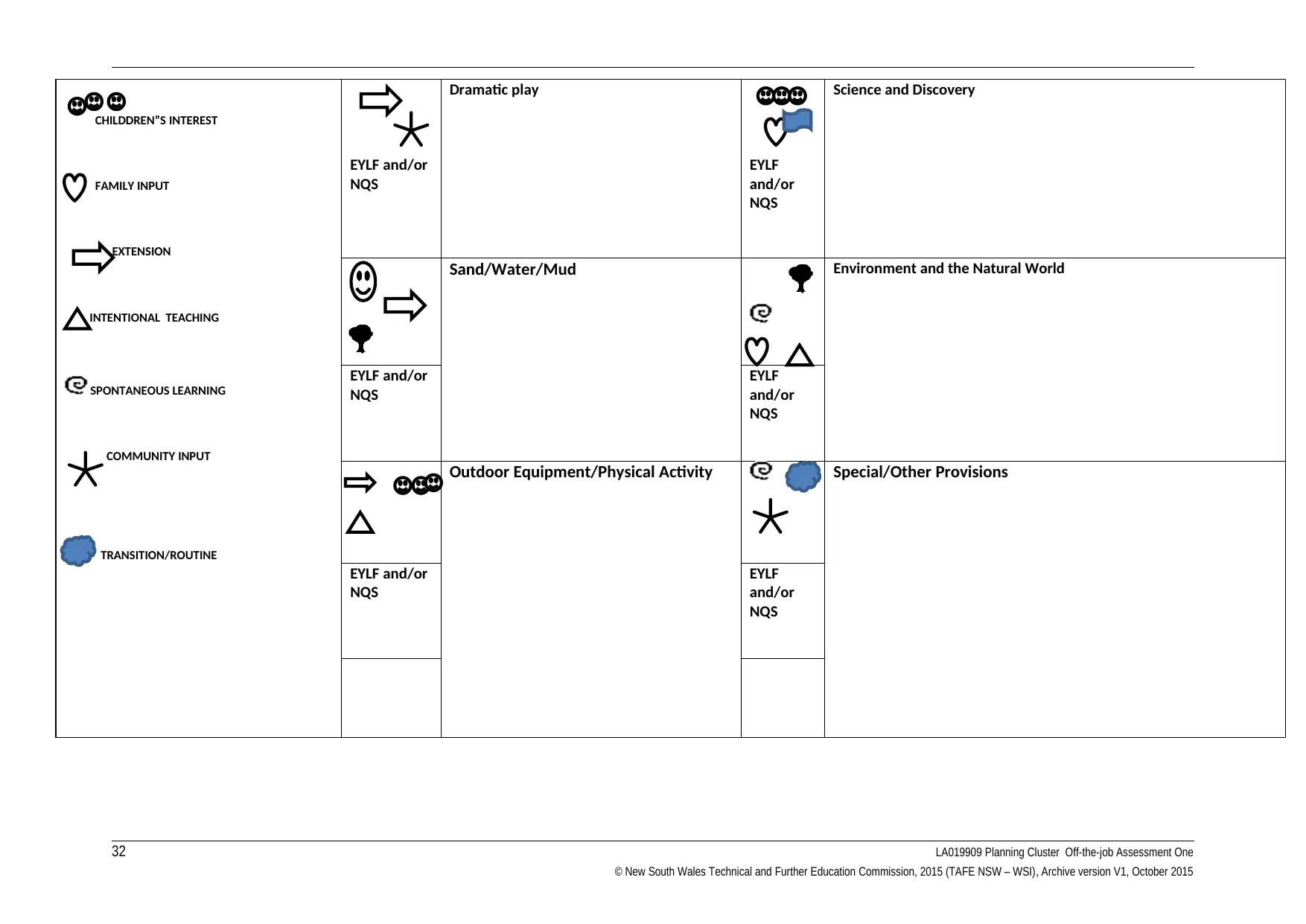
CHILDDREN”S INTEREST
FAMILY INPUT
EXTENSION
INTENTIONAL TEACHING
SPONTANEOUS LEARNING
COMMUNITY INPUT
TRANSITION/ROUTINE
EYLF and/or
NQS
Dramatic play
EYLF
and/or
NQS
Science and Discovery
Sand/Water/Mud Environment and the Natural World
EYLF and/or
NQS
EYLF
and/or
NQS
Outdoor Equipment/Physical Activity Special/Other Provisions
EYLF and/or
NQS
EYLF
and/or
NQS
32 LA019909 Planning Cluster Off-the-job Assessment One
© New South Wales Technical and Further Education Commission, 2015 (TAFE NSW – WSI), Archive version V1, October 2015
FAMILY INPUT
EXTENSION
INTENTIONAL TEACHING
SPONTANEOUS LEARNING
COMMUNITY INPUT
TRANSITION/ROUTINE
EYLF and/or
NQS
Dramatic play
EYLF
and/or
NQS
Science and Discovery
Sand/Water/Mud Environment and the Natural World
EYLF and/or
NQS
EYLF
and/or
NQS
Outdoor Equipment/Physical Activity Special/Other Provisions
EYLF and/or
NQS
EYLF
and/or
NQS
32 LA019909 Planning Cluster Off-the-job Assessment One
© New South Wales Technical and Further Education Commission, 2015 (TAFE NSW – WSI), Archive version V1, October 2015
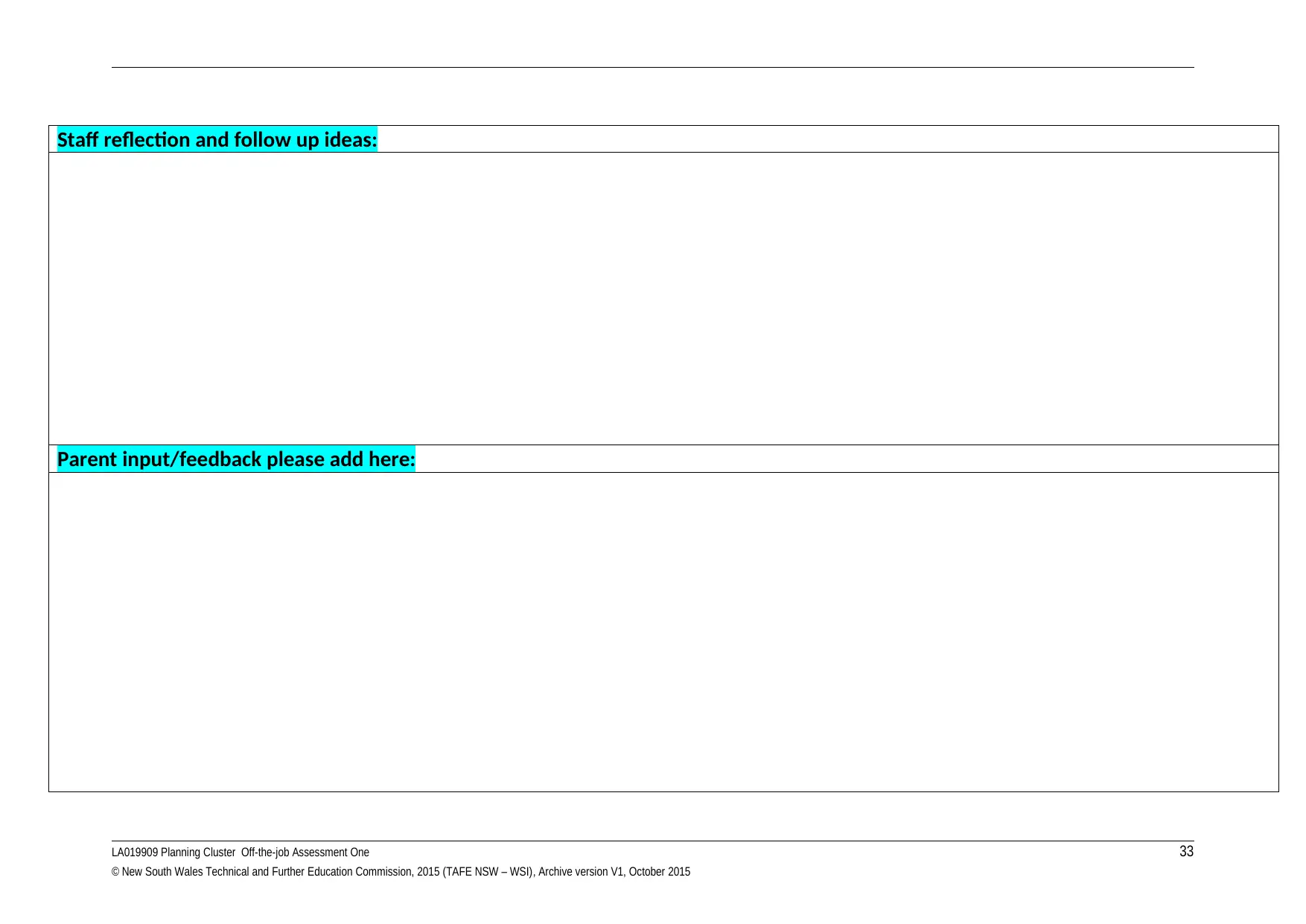
Staff reflection and follow up ideas:
Parent input/feedback please add here:
LA019909 Planning Cluster Off-the-job Assessment One 33
© New South Wales Technical and Further Education Commission, 2015 (TAFE NSW – WSI), Archive version V1, October 2015
Parent input/feedback please add here:
LA019909 Planning Cluster Off-the-job Assessment One 33
© New South Wales Technical and Further Education Commission, 2015 (TAFE NSW – WSI), Archive version V1, October 2015
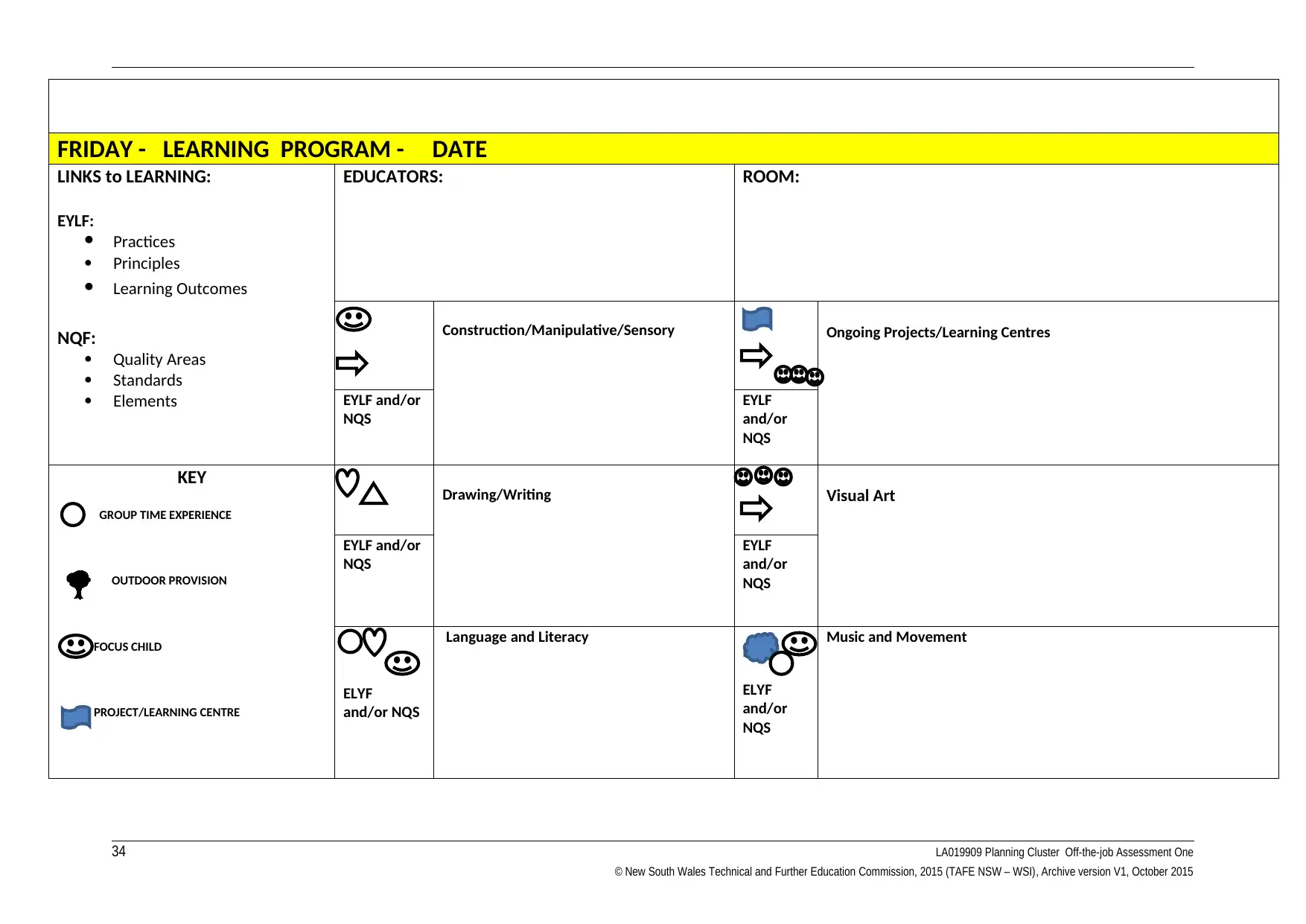
FRIDAY - LEARNING PROGRAM - DATE
LINKS to LEARNING:
EYLF:
Practices
Principles
Learning Outcomes
NQF:
Quality Areas
Standards
Elements
EDUCATORS: ROOM:
Construction/Manipulative/Sensory Ongoing Projects/Learning Centres
EYLF and/or
NQS
EYLF
and/or
NQS
KEY
GROUP TIME EXPERIENCE
OUTDOOR PROVISION
FOCUS CHILD
PROJECT/LEARNING CENTRE
Drawing/Writing Visual Art
EYLF and/or
NQS
EYLF
and/or
NQS
ELYF
and/or NQS
Language and Literacy EYLF
ELYF
and/or
NQS
Music and Movement
34 LA019909 Planning Cluster Off-the-job Assessment One
© New South Wales Technical and Further Education Commission, 2015 (TAFE NSW – WSI), Archive version V1, October 2015
LINKS to LEARNING:
EYLF:
Practices
Principles
Learning Outcomes
NQF:
Quality Areas
Standards
Elements
EDUCATORS: ROOM:
Construction/Manipulative/Sensory Ongoing Projects/Learning Centres
EYLF and/or
NQS
EYLF
and/or
NQS
KEY
GROUP TIME EXPERIENCE
OUTDOOR PROVISION
FOCUS CHILD
PROJECT/LEARNING CENTRE
Drawing/Writing Visual Art
EYLF and/or
NQS
EYLF
and/or
NQS
ELYF
and/or NQS
Language and Literacy EYLF
ELYF
and/or
NQS
Music and Movement
34 LA019909 Planning Cluster Off-the-job Assessment One
© New South Wales Technical and Further Education Commission, 2015 (TAFE NSW – WSI), Archive version V1, October 2015
Secure Best Marks with AI Grader
Need help grading? Try our AI Grader for instant feedback on your assignments.
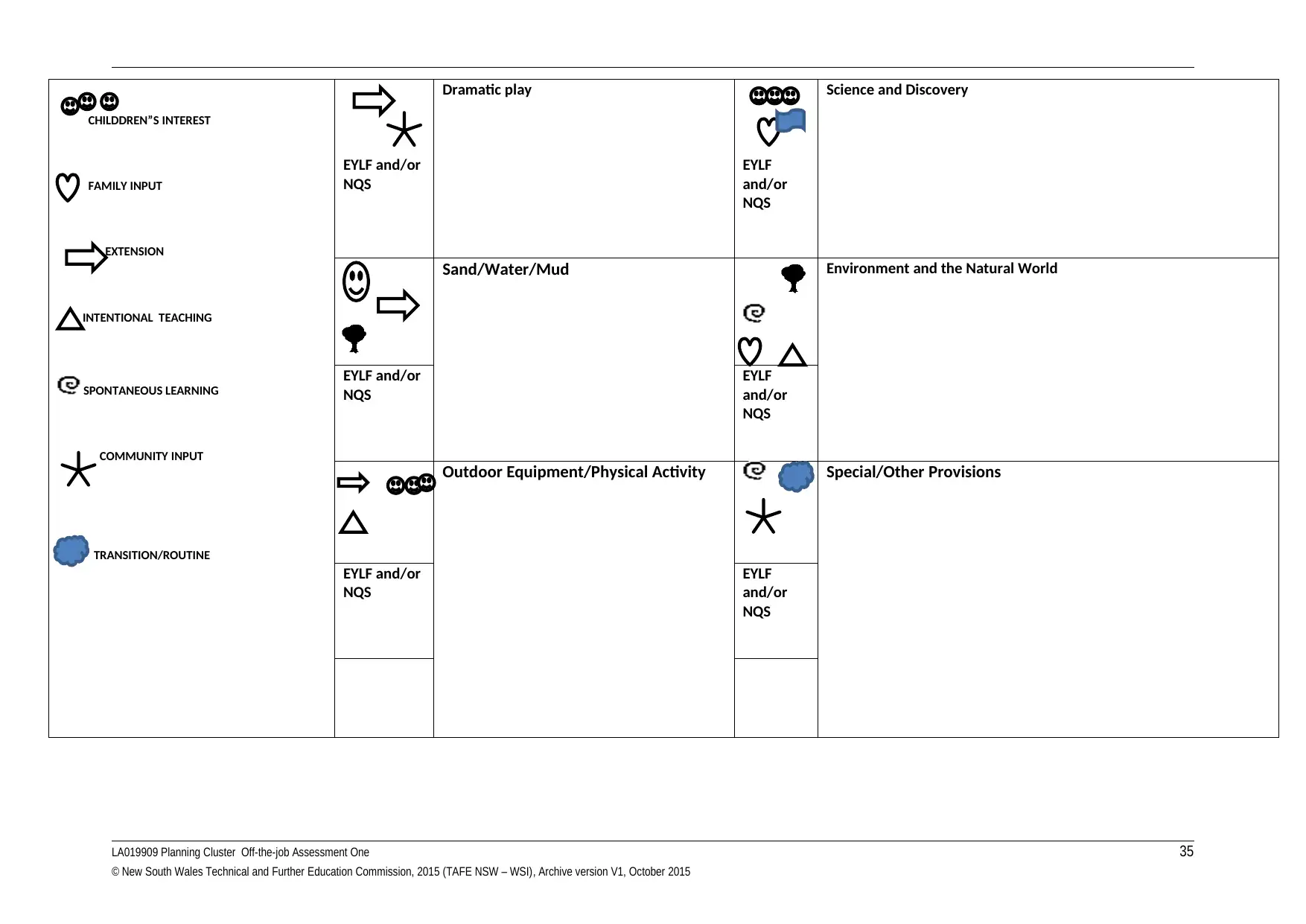
CHILDDREN”S INTEREST
FAMILY INPUT
EXTENSION
INTENTIONAL TEACHING
SPONTANEOUS LEARNING
COMMUNITY INPUT
TRANSITION/ROUTINE
EYLF and/or
NQS
Dramatic play
EYLF
and/or
NQS
Science and Discovery
Sand/Water/Mud Environment and the Natural World
EYLF and/or
NQS
EYLF
and/or
NQS
Outdoor Equipment/Physical Activity Special/Other Provisions
EYLF and/or
NQS
EYLF
and/or
NQS
LA019909 Planning Cluster Off-the-job Assessment One 35
© New South Wales Technical and Further Education Commission, 2015 (TAFE NSW – WSI), Archive version V1, October 2015
FAMILY INPUT
EXTENSION
INTENTIONAL TEACHING
SPONTANEOUS LEARNING
COMMUNITY INPUT
TRANSITION/ROUTINE
EYLF and/or
NQS
Dramatic play
EYLF
and/or
NQS
Science and Discovery
Sand/Water/Mud Environment and the Natural World
EYLF and/or
NQS
EYLF
and/or
NQS
Outdoor Equipment/Physical Activity Special/Other Provisions
EYLF and/or
NQS
EYLF
and/or
NQS
LA019909 Planning Cluster Off-the-job Assessment One 35
© New South Wales Technical and Further Education Commission, 2015 (TAFE NSW – WSI), Archive version V1, October 2015
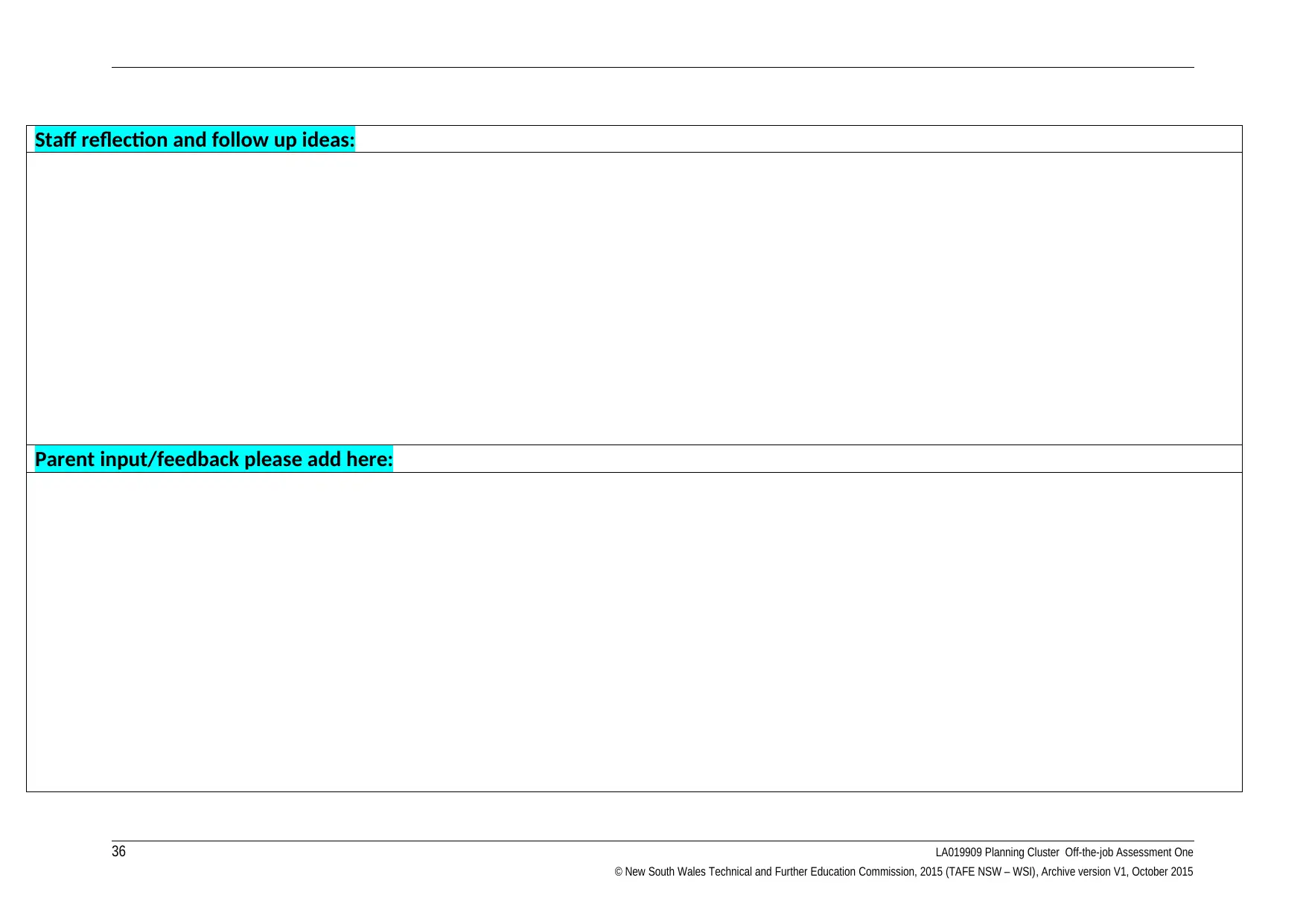
Staff reflection and follow up ideas:
Parent input/feedback please add here:
36 LA019909 Planning Cluster Off-the-job Assessment One
© New South Wales Technical and Further Education Commission, 2015 (TAFE NSW – WSI), Archive version V1, October 2015
Parent input/feedback please add here:
36 LA019909 Planning Cluster Off-the-job Assessment One
© New South Wales Technical and Further Education Commission, 2015 (TAFE NSW – WSI), Archive version V1, October 2015
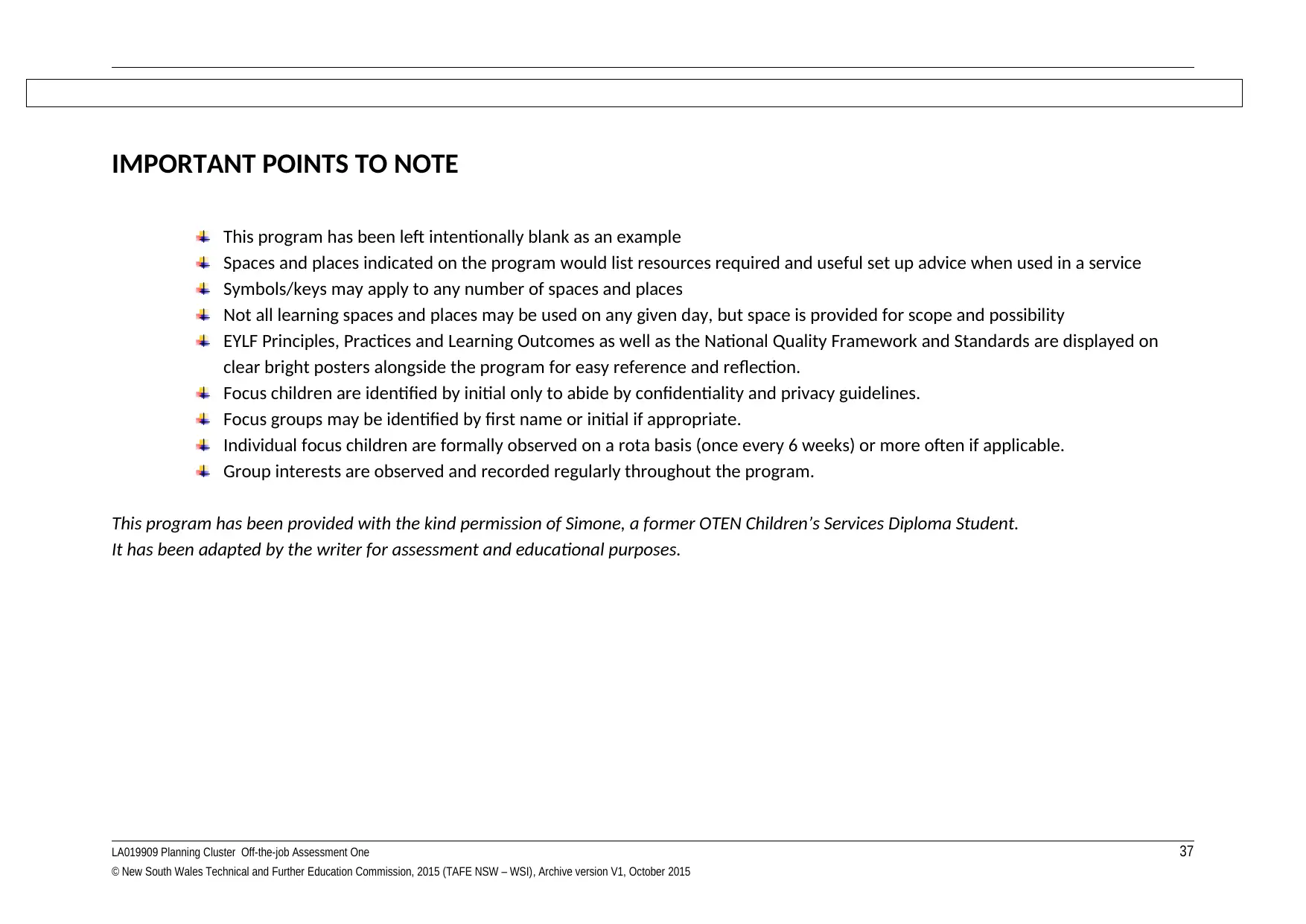
IMPORTANT POINTS TO NOTE
This program has been left intentionally blank as an example
Spaces and places indicated on the program would list resources required and useful set up advice when used in a service
Symbols/keys may apply to any number of spaces and places
Not all learning spaces and places may be used on any given day, but space is provided for scope and possibility
EYLF Principles, Practices and Learning Outcomes as well as the National Quality Framework and Standards are displayed on
clear bright posters alongside the program for easy reference and reflection.
Focus children are identified by initial only to abide by confidentiality and privacy guidelines.
Focus groups may be identified by first name or initial if appropriate.
Individual focus children are formally observed on a rota basis (once every 6 weeks) or more often if applicable.
Group interests are observed and recorded regularly throughout the program.
This program has been provided with the kind permission of Simone, a former OTEN Children’s Services Diploma Student.
It has been adapted by the writer for assessment and educational purposes.
LA019909 Planning Cluster Off-the-job Assessment One 37
© New South Wales Technical and Further Education Commission, 2015 (TAFE NSW – WSI), Archive version V1, October 2015
This program has been left intentionally blank as an example
Spaces and places indicated on the program would list resources required and useful set up advice when used in a service
Symbols/keys may apply to any number of spaces and places
Not all learning spaces and places may be used on any given day, but space is provided for scope and possibility
EYLF Principles, Practices and Learning Outcomes as well as the National Quality Framework and Standards are displayed on
clear bright posters alongside the program for easy reference and reflection.
Focus children are identified by initial only to abide by confidentiality and privacy guidelines.
Focus groups may be identified by first name or initial if appropriate.
Individual focus children are formally observed on a rota basis (once every 6 weeks) or more often if applicable.
Group interests are observed and recorded regularly throughout the program.
This program has been provided with the kind permission of Simone, a former OTEN Children’s Services Diploma Student.
It has been adapted by the writer for assessment and educational purposes.
LA019909 Planning Cluster Off-the-job Assessment One 37
© New South Wales Technical and Further Education Commission, 2015 (TAFE NSW – WSI), Archive version V1, October 2015
1 out of 37
Related Documents
Your All-in-One AI-Powered Toolkit for Academic Success.
+13062052269
info@desklib.com
Available 24*7 on WhatsApp / Email
![[object Object]](/_next/static/media/star-bottom.7253800d.svg)
Unlock your academic potential
© 2024 | Zucol Services PVT LTD | All rights reserved.





